#and then the pandemic and right when i was on the verge of independence yet again the fucking derecho hit
Text
making slow but eventual progress on this fic has me fixating even more on the reasons why i find myself resonating with julia just as much as i did with gerry when i first listened to the podcast... incarcerated family members... working night jobs... homelessness... traumatic experiences with counselors, mental health professionals and social workers...

#my similarities with canon gerry have everything to do with avoiding the abusers i’m once again forced to live with#working at night and being (quietly) active while they’re asleep so i can have some freedom#after having independence and then having it ripped away; first bc of unemployment then bc of my surgery#and then the pandemic and right when i was on the verge of independence yet again the fucking derecho hit#listening to tma in the middle of all of this made me weep like#wow. he had to put up with a mother like that and he still found those small ways to spite her#it feels like i’m just waiting around for my opportunities like i’m always ready to take them#ready to take them at ANY moment like they’re going on a camping trip? it’s time. they’re sleeping? they’re at a party? time.#the only big comfort comes from doorhandles that lock from the inside-only and#the fact that my abusive family members are heavy sleepers#abuse#abuse mention#abuse cw#smoking#smoking cw#cigarette#cigarettes#cigarettes cw#medical abuse mention#parents mention#dairywrites#dairy.txt
4 notes
·
View notes
Text
Once Again, Greg Abbott Is A Lethal Cretinous Scumbag
Letters From An American
Heather Cox Richardson Jun 20
Yesterday, Texas Governor Greg Abbott, a Republican, made good on his threat to defund the legislature after Democrats walked out on May 30 in order to deny the Republicans the number of people they needed to hold a vote on a bill that dramatically reworked Texas elections.
In part, Abbott is likely trying to distract Texans from yet another crisis in the state’s independent energy grid, operated by the Electric Reliability Council of Texas (ERCOT). Four months ago, the electric grid failed during a cold wave, leaving more than 3 million people without electricity or heat. More than 100 people died. Now, mechanical failures during a heat wave have pushed the state to the verge of blackouts and have prompted ERCOT to ask people to turn their AC to higher temperatures, turn off their lights, and avoid using appliances that take a lot of electricity.
To make matters worse, yesterday the Public Utility Commission of Texas lifted a moratorium on electricity disconnections put in place on private utilities because of the pandemic and extended because of the February storm. It is not clear how many people will be affected by this change, but two public utilities in Austin and San Antonio say that in late May a quarter of a million households owed an average of $600 on past-due bills.
So it makes sense for Abbott—who has been throwing himself behind Trump-like causes anyway these days—to stir up headlines by defunding the legislature and blaming Democrats, even though, once the election bill failed, a number of Republicans told political journalist Judd Legum, who writes at Popular Information, that they did not know where some of the measures in it had come from and did not like them. For example, one lawmaker said that the provision to enable Texas judges to declare an election “void” at their discretion if someone charged that it had been fraudulent, “would be horrendous policy.” (That section of the bill was actually titled “OVERTURNING ELECTIONS.”) In any case, Abbott’s gesture will hit not legislators, but staffers.
But Abbott’s attack on voting rights in Texas identifies the crux of the current crisis in American democracy. For thirty years, Republicans have strengthened their hand in elections not by adjusting their message to win more voters but by gaming the system: suppressing the vote and gerrymandering.
When voters put the Democrats in charge of the federal government in 2020, Republicans responded by trying to game the system at the state level even more completely. First, when former president Trump refused to accept his loss in the election, he and some of his cronies tried to pressure Republicans in state governments to “find” the votes he needed to win, count out Democratic ballots, or, failing either of those things, allow state legislatures to choose their own electors rather than the ones that reflected the will of the voters. Their justification was the Big Lie: that Trump had won the election but had been cheated of the White House by fraud.
Their attempts led to the January 6 insurrection but did not succeed in putting Trump back into the White House. Since then, in Republican-dominated states across the country, legislatures have used the Big Lie to justify the sort of election “reform” that cuts back voting rights and enables state officials to overturn the popular vote. If those rules go into effect, it will be virtually impossible for Democrats to win a majority in the future. And a one-party government is not a democracy.
The conflict over elections, then, is a conflict over the nature of our government. It will play out over the next week, as the Senate takes up S1, the For the People Act. This measure protects the right to vote, ends partisan gerrymandering, limits the influence of money in politics, and establishes new ethics rules for presidents and other federal officeholders. The House has already passed a similar act on a strict party vote, but the measure cannot pass the Senate under the Senate’s current rules. The filibuster will permit just 41 of the 50 Republican senators to stop the act from passing.
Democrats could pass the act if all 51 Democrats (including Vice President Kamala Harris, who breaks a tie in the Senate) voted in favor both of the measure and of ending the filibuster. But Senator Joe Manchin (D-WV) has made it very clear he opposes both. He has also said he wants any measure going forward to be bipartisan.
But that is not the final word on the For the People Act.
Last week, Manchin indicated which of the measures in the For the People Act—and in the John Lewis Voting Rights Advancement Act—he supports. He has called for expanding access to voting, an end to partisan gerrymandering, voter ID, automatic registration at motor vehicle offices, making Election Day a holiday, and making it easier for state officials to purge voters from the rolls. This is a mixture of the priorities of the leadership of both parties.
The Democrats have lined up behind Manchin’s compromise. Voting rights advocate Stacey Abrams, former Texas congressman and voting rights advocate Beto O’Rourke, and Democratic National Committee Chair Jaime Harrison have all signed on to Manchin’s blueprint. “I am so grateful for what Senator Manchin has done and what he's doing right now,” O’Rourke said. “He's trying to find a way to protect voting rights in this country at a moment that they are under attack in more than 40 states.”
But Republican leadership has dug in its heels against the measure. They immediately tried to associate it publicly with Abrams rather than the conservative Manchin, and Senate Minority Leader Mitch McConnell (R-KY) said no Republican should vote for it. Since then, he has held two press conferences— unusual for him—to voice his objections to the bill, suggesting he is concerned that some Republicans might be wavering. As if to make sure they would all stay on board, yesterday, former president Trump endorsed a primary challenger against Senator Lisa Murkowski.
But the pieces in the For the People Act itself—even before Manchin’s compromises—are generally very popular among people of both parties. What will happen when Senate Majority Leader Chuck Schumer (D-NY) forces a vote on the bill or, perhaps, breaks it up into pieces, taking away Republicans’ ability to make the blanket argument that they don’t like federal legislation on voting? Will Republicans hold their wall if they are forced to vote on the bill piece by piece?
And, in the service of a very popular bill that will protect our democracy, opposed by an entrenched minority that refuses to compromise as the Democrats have, will Manchin agree to carving out voting legislation from the filibuster as the Senate has already carved out financial measures and judicial nominations?
What is on the table this week is a bill that carries outsized weight for its role in our democracy. In 1854, Democrats pushing the Kansas-Nebraska Act cleared the way for the spread of human enslavement to the new western territories and the subsequent domination of the federal government by elite slave owners. In 1890, Republicans backing the Federal Elections Bill tried, one last time, to protect Black voting before voter suppression ended it for the next seventy years. In 1965, Democrats and Republicans together agreed to end racial discrimination in voting.
In 2021, once again, Congress will be voting on a measure that will define who we are.
4 notes
·
View notes
Text
Ranking : Spike Lee (1957 - present)
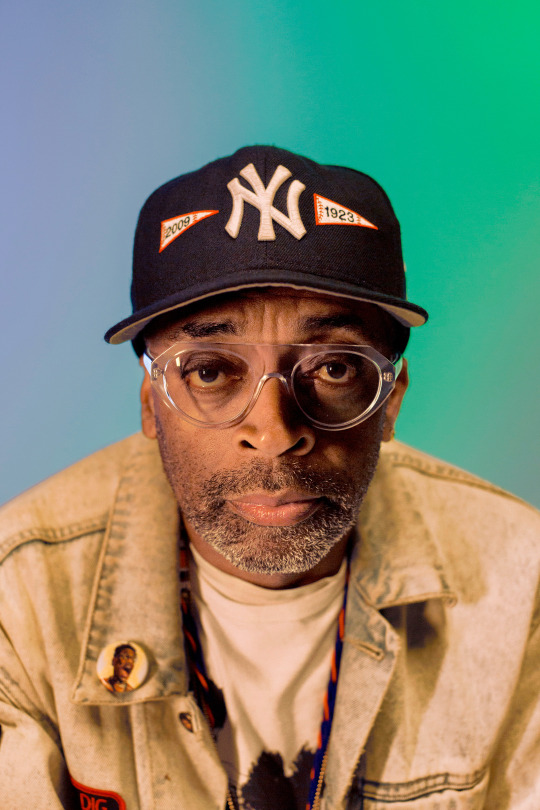
There have been countless directors whose careers have spanned my lifetime, but out of these countless masses, the one whom I can find the most in common ground with (as well as endless inspiration from) is Spike Lee. A New Yorker through and through, Lee went from a series of films that seamlessly blended hip-hop and old school Hollywood aesthetics, to personal films, to his take on the blockbuster, and currently, to the point where his canon has earned him artistic freedom and expression that many of his peers have not been able to achieve. He is the perfect bridge between the director-driven mindset of the 1970s and the cultural boundary-pushing films of the 1990s-forward. Not everything that he directed was a hit or a masterpiece, but this man has more iconic films under his belt that some directors have films to their name. That being said, it’s time to stir the pot and make an attempt at the monumental task that is ranking the films of Spike Lee.
I will only be including theatrically released feature films of Spike Lee that I have seen. His documentary work will be excluded, as well as his films I have missed or have yet to see. Here is a list of these films : Da 5 Bloods, Chi-Raq, Da Sweet Blood of Jesus, Joe’s Bed-Stuy Barbershop: We Cut Heads, 4 Little Girls, The Original Kings of Comedy, When the Levees Broke, A Huey P. Newton Story.

20. Oldboy (2013)
Every film that you make can’t be a winner. In the case of Lee’s attempt at remaking Oldboy, there were already two major strikes against it : a superior version of the film already existed, and that version was the middle film of a trilogy. I doubt that even a team of the most talented directors could have made a superior version of Oldboy that surpassed the original, but after 30 years of making films, it’s admirable that Lee would even attempt something so bold and seemingly insurmountable.

19. Red Hook Summer (2012)
When your film catalog covers three decades, there’s bound to be some overlap, be it stylistically or narratively. I’ve only seen Red Hook Summer once, but it was impossible for me to look at it subjectively, as it seemed to be a modern day mirror to another one of Lee’s explorations of New York adolescence. While this story is not a direct copy of a Spike Lee film that I will go into more detail on later, it does feel like the update equivalent that focuses on himself rather than the childhood of his sister. While an entertaining film from what I can remember, it sits behind a list of previous impressive achievements.
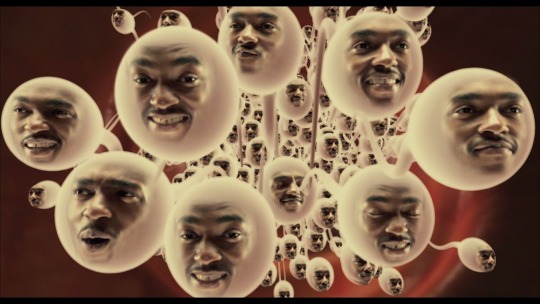
18. She Hate Me (2004)
Humor has been an element present in a number of Spike Lee films, but for my money’s worth, this film is the closest thing to an outright comedy that he ever made. Like a number of films on the back half of his career, he is touching upon important topics (sexuality and toxic masculinity, in this case), but these are topics that he has hit with more nuance and creativity in earlier films. This film did help transition Anthony Mackie into a leading man role, and he certainly took that opportunity and ran with it, so She Hate Me could be heralded for that alone. That being said, it was a great idea that slightly missed the mark, therefore placing it on the backend of the memorable films list for Lee.

17. Miracle at St. Anna (2008)
This film had the potential to be a breakout resurgence for Spike Lee. He was coming hot off the heels of Inside Man, a perfect blend of Lee’s style and modern Hollywood fare, so having a period-piece war film seemed like a slam dunk. His cast was strong, while also being filled of relatively unknown young actors on the verge of becoming stars in their own right, but for whatever reason, this film failed to make a connection with the masses. While I do remember mostly enjoying my watch, I also remember feeling a bit underwhelmed by the ending, which in turn left me lacking a reason to revisit it. Maybe it’s a hidden gem that I haven’t seen enough times yet, but at this moment in time, its home is near the bottom of Lee’s impressive list of films.

16. Get on the Bus (1996)
Many people’s eyes were opened to racial injustices during the COVID-19 pandemic, as several African-American men and women found themselves on the wrong end of violent acts from the police and other citizens in the midst of a ‘shelter-in-place’ era. Not only have these injustices been going on for my entire lifetime, but they’ve been a generational trauma for many African-Americans in the United States. When the Million Man March was announced in 1996, it was not surprising that Spike Lee took it as an opportunity to both document the march and build a narrative around it in which he could showcase a collection of actors he’d either featured in past films or would work with in future films. To my knowledge, this is one of maybe two or three films about the event, and it was certainly the film released in the closest proximity to it. For an independent, quick shoot, it definitely stands up, but in comparison to Lee’s other works that benefited from full crews and production schedules, it finds itself paling in comparison.
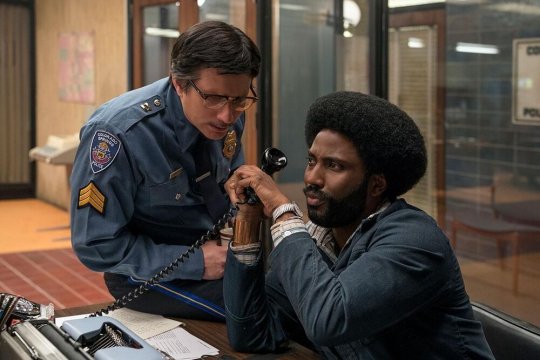
15. BlacKkKlansman (2018)
Despite the fact that this is the film that finally got Lee some sort of recognition at the Oscars, BlacKkKlansman was not quite the true return to form that many fans of Spike Lee expected. The film had moments of humor, compelling moments that directly focused on racial injustice and systematic oppression, and it pulled no punches while doing so. Like a handful of Lee’s other films, however, this one falls when compared to his other films that deal with similar subject matter. Adam Driver continued to show fans his expansive range, and Jasper Paakonen deserved INFINITELY more recognition than he got, but ultimately, this film checks all the ‘good’ boxes where it was expected to check the ‘great’ ones.

14. 25th Hour (2002)
As the year 2000 approached, Lee seemed to attempt and make a shift from films that specifically spoke on aspects of the African-American experience in favor of occasional films that reached a wider audience. While Summer of Sam would be considered the first foray into that realm, the true mark of this elevated sense of creative duty came in the form of 25th Hour. With the actors in tow, in tandem with the cinematography and skilled directing ability displayed in the film, one would expect a powerhouse movie, but ultimately, the expectations exceeded the narrative of this film. This one is entertaining, don’t get me wrong, but I personally did not find a connection with the story, meaning that the film was, at best, fun to watch.
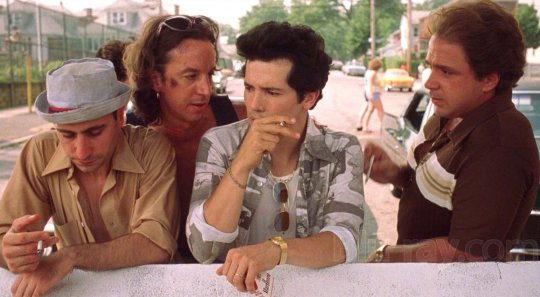
13. Summer of Sam (1999)
I’ve been a true-crime junkie since my early teenage years, and even the most casual of true-crime fans is more than likely familiar with David Berkowitz, also known to many as the Son of Sam. While Red Hook Summer did come out after Summer of Sam, it’d be hard to deny the fact that Summer of Sam is the last of Lee’s love letters to New York City. This was the film where Spike Lee stepped out of his comfort zone of the African-American experience, choosing instead to focus on more colloquial aspects of the American experience, and for my money’s worth, it was the start of an important shift for him. Despite being light on the Son of Sam action, the actors this film does focus on (and the story it chooses to tell) is a fresh look at a familiar era, and a crowning achievement that signaled new things for Spike Lee.
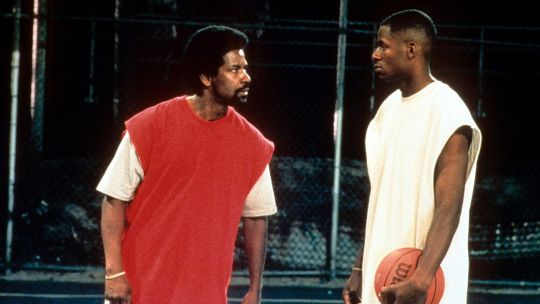
12. He Got Game (1998)
If you made a Venn diagram of people familiar with Spike Lee, the two biggest circles would be film fans and people who have seen at least one New York Knicks game since the 1990s. Therefore, the only thing that was really and truly surprising about He Got Game was the fact that it took Spike Lee 15 years and 11 films to make a film about basketball. On the outset, that’s exactly what it is : a film about basketball. Viewed with a wider lens, however, this story is a love letter to one of the most popular American inventions, and a story about how it can serve as a common-ground bridge for those from wholly different walks of life. The juxtaposition of Aaron Copland and Public Enemy made the soundtrack provocative, and Ray Allen stood out in his lead role, holding his own against the living legend that is Denzel Washington, who is always good for a stellar performance in a Spike Lee joint. Don’t mistake this film’s place on the list for my feelings about it... this is a stellar film, in my opinion, and one of my favorites to revisit.
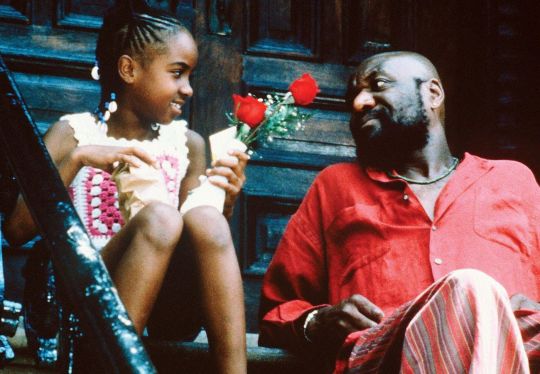
11. Crooklyn (1994)
After making what many would argue to be the most important film of his career (which we will eventually get to), it’s no surprise that Spike Lee circled his creative wagons and made the focus of his next film inward. Crooklyn covers what seem like many personal bases for Spike Lee : he portrays the New York of the past vividly and beautifully, while spinning a true-to-life tale based on his personal experience, but opting to focus on his sister Joie Lee and his father Bill Lee. Of Lee’s many, many films, this was the one that I felt the most compelled to see at the time of release, it is one of the two I have the most vivid memories and recollections of, and it has a number of stylistic choices that keep me wonderfully perplexed to this day. Despite not cracking the top ten Spike Lee films, this one ranks high on the list of Spike Lee films that hit the bullseye of my heart.
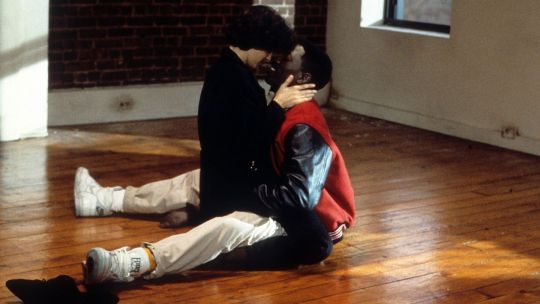
10. Jungle Fever (1991)
Interracial romance is one of those things that seemingly will always be a sensitive subject. I’ve heard many people say that Jungle Fever has a dated look on the subject, but I’d argue that the film was very forward thinking, especially in showing that an interracial romance is not the answer to the cultural and societal problems that life presents us. The movie also touches deeply on drug addiction without crossing over into the realm of being preachy or talking down to the viewer. It didn’t hurt that Stevie Wonder also managed to create a soundtrack’s worth of new material that instantly brought the seemingly controversial film directly into the public eye. Maybe it is dated... maybe it is uncomfortable... but what it is, undoubtedly, is an early masterpiece that fell near the end of one of the most stellar introductory runs that any filmmaker has presented us.
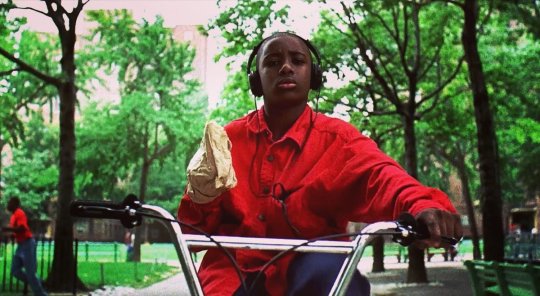
9. Clockers (1995)
Ever wonder what would happen if a Martin Scorsese film found its way into the hands of Spike Lee? Well, wonder no longer, because Clockers is out there waiting for you to discover it. The amount that this movie gets slept on is an outright tragedy and travesty. The soundtrack is KILLER, the color-timing puts the viewer in an immediate ‘cold-world’ environment, the order of operations presented in this film is brutal and unforgiving, and yet, it manages to be one of the most heartfelt films in the Spike Lee canon. EVERYONE presented in this movie brought their A-game to the table, from the Spike Lee regulars like Isaiah Washington, John Turturro and Harvey Keitel, to the glorified cameos and supporting roles, like Thomas Jefferson Byrd, Sticky Fingaz and Fredro of Onyx, and relative newcomer but promising leading man Makhi Phifer. This film is intense, but it is more than worth your time and attention.
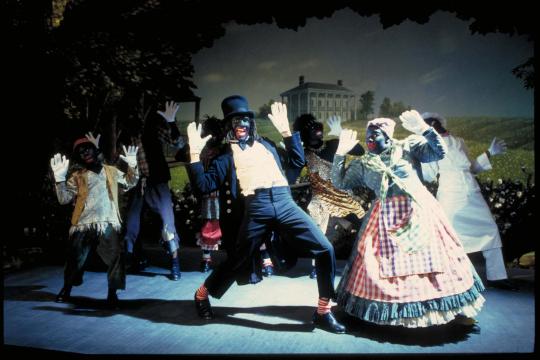
8. Bamboozled (2000)
Bamboozled was shocking when it was released, to say the least. The true revelation, however, has been the way that relevance has seemingly caught up to the film... fake wokeness, modern day minstrel shows, low budget/high yield television and behind the scenes scandals have all come to light many years after this film had its initial run. While this film did not transition Savion Glover into the world of superstardom and crossover success, it certainly crystalized his immense talent and charisma in a way that his recordings of stage shows had previously been unable to capture. The imagery of America’s strange fascination with the dehumanization of African-Americans for generation after generation is rich, and every performance is compelling. This was definitely Spike Lee’s first masterpiece of the new millennium, and at the risk of being bittersweet, probably one of his last truly stunning achievements.

7. Girl 6 (1996)
Every ranking list has to have the controversial placement, so here’s mine... Girl 6 started as a lingering interest for me. The internet was just about to change the world, but we were still locked into landlines at the time, with cellular being a luxury, so the world of phone sex still had relevance. Upon seeing the film, however, I quickly realized that the phone sex exploration was playing counter to a Hollywood hopeful narrative that was brave enough to explore new ground (per the changing times) while being mindful enough to pay homage to the countless stories of Hollywood hopefuls that came before it. Many of the shifting cinematography looks that made Clockers so gritty were used to make Girl 6 feel dangerously euphoric. The list of cameos and brief supporting roles were not only a who’s who of cultural movers and shakers at the time, but it ran about as long as my arm. I recently revisited the film and expected it to be a bit more on the side of kitsch, but surprisingly, the times had not been as hard on the film as I anticipated. The film shifts quite well between light and dark, and even the ending that initially slightly annoyed me has found a strange sort of charm in my older, more life-experienced years. Add to this the hilarious running joke of Isaiah Washington being a kleptomaniac in nearly every scene he appears in, and there’s a realization that there are sublayers going on right in front of our eyes. This collaboration with Suzan-Lori Parks gives me hope that maybe one day, we’ll get a Spike Lee film adaptation of Topdog/Underdog, but we will see.
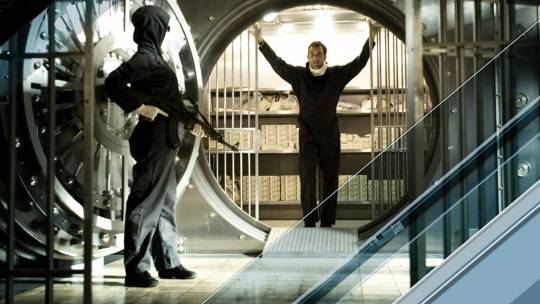
6. Inside Man (2006)
If you had to pick the most ‘Hollywood’ of the Spike Lee films, my money would be on this film ending up as the chosen one. By this rationale, it makes the film that much more impressive, as it also stands out as one of the most compelling, well-directed and well-acted Spike Lee films. At the time of its release, it was not only a return to form, but it seemed to signal an evolution. Spike Lee was able to use his signature, iconic shots that he was known for, like his camera-turned-to-dolly float, or the push-pull zooms, but he was also able to incorporate familiar Hollywood tropes, including the twist ending, and give them a breath of fresh air via an newly infused sense of style. Lee also stayed true to himself by educating as well as entertaining, bringing to light how atrocities from the past have more than historical connections to modern day benefactors. While I do think there are a handful of better ‘pure’ Spike Lee films, if I had to pick one movie for a curious party that my be skeptical, this would easily be my pick.

5. She's Gotta Have It (1986)
Oh, the joy of having your first film be a breakout success, but not to the point of pigeon-holing your career. She’s Gotta Have It was an important introductory step to the masses for Spike Lee : it showed his dedication to putting African-American performers into familiar narratives, it showed an appreciation for the voice of women on film that many first-time directors would likely not want to be the initial association to their style, it introduced the world to Mars Blackmon (who became a cultural icon), and it presented sense of style that switched on the viewer the moment before they could label it pretentious. Having characters address the camera made it feel like a play or a novel, but when the film shifted into movie mode, the camera moved with the energy and grace of a performance artist or dancer, which in turn fed into the character development and narrative it presented. As a bonus, the property found new life nearly 40 years later as a Netflix original series, introducing new generations to a modern day classic statement of feminism, and how it does not excuse bad behavior.
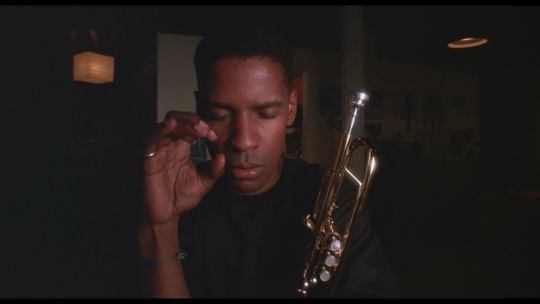
4. Mo' Better Blues (1990)
Those familiar with Spike Lee’s family know that he was raised by jazz bassist Bill Lee, who scored some of Spike’s early films. By this rationale, it comes as no surprise that Lee could make such a rich, nuanced and heartfelt film about jazz music that serves as an allegory for the hurdles that beset those driven purely by passion. The conversations about race, musical integrity and commercialism also work on both direct and symbolic levels, giving Mo’ Better Blues some of the highest repeat viewing value of any film in the Spike Lee canon. The film also marked the first collaboration of Spike Lee and Denzel Washington, a combination that yielded artistic, career, creative, commercial and critical success, led to a multitude of classic performances, and ultimately led to a generational collaborative changing of the guard in the form of John David Washington. The only negative I can give this film is that it did not lead to future films that explored genres of music like hip-hop and soul. While She’s Gotta Have It did focus heavily on relationships and intimacy, it could be argued that Mo’ Better Blues was Spike Lee’s first adult contemporary film, and his first look at modern romance in the more ‘traditional’ sense.

3. School Daze (1988)
The African-American college experience, specifically that of HBCUs (Historically Black College and Universitys), is one that has often been neglected in the annals of film history. As a graduate of Clark Atlanta University, it makes total sense that Spike Lee’s second commercial film would focus on that specifically overlooked culture, as it became a fitting vehicle for establishing Lee’s sense of duty and responsibility for education, sharing the African-American experience to the masses, and exposing systematic injustices and hypocrisies that kep the disadvantaged in a disadvantaged position. The real genius of this film, however, comes in the juxtaposition of presentations it jumps between... for the majority of the film, it is an unflinching look at the coming of age process that teenagers must traverse on their way to adulthood, including the hurdles of romance, forming your identity and expanding your view of the world around you. At key moments, however, the film switches into musical numbers, song performances and school dances that not only expand on the inner feelings, emotions and desires of characters, but heighten the reality of the story to a dizzying pace. In all the ways that She’s Gotta Have It put the world on notice that a unique voice was present in the industry, School Daze signaled the continuation of a run that would last another handful of films, and it firmly established Spike Lee as a generational talent.
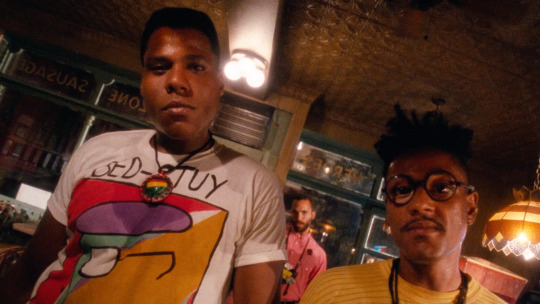
2. Do the Right Thing (1989)
I would guess that over the course of a career, a director secretly hopes that at least one of their works comes close to making an impact culturally. In the case of Spike Lee, however, we have a man who released two cultural-shifting films, and did so in a span of less than 5 years. They say the third time is a charm, and that’s exactly what Do the Right Thing was for Spike Lee. The vivid colors, stylistic earmarks, historical and cultural sense of urgency and focus on telling minority stories all expanded greatly with this film, which acted as both a parable of how past injustices can come back to haunt you, and a harbinger of how the reactions to these continued injustices would only amplify if not addressed. The fact that Spike Lee not only directed this film, but played the lead actor as well, is a monumental achievement, especially considering how few flaws the film has, if any. Several established actors played some of their most iconic roles in this film, and a breadth of newer, younger faces exploded onto the scene, almost all of whom either continued to work with Lee or found themselves evolving their careers in the wake of Do the Right Thing. The film is also directly responsible for perhaps the most iconic hip-hop song of all time, Public Enemy’s classic protest anthem Fight The Power. Any fan of film would be foolish to skip the Spike Lee catalog, but regardless of whether you’re interested in his work or not, this film is one of two he made that should flatly be considered required viewing across the board. The other one, being...
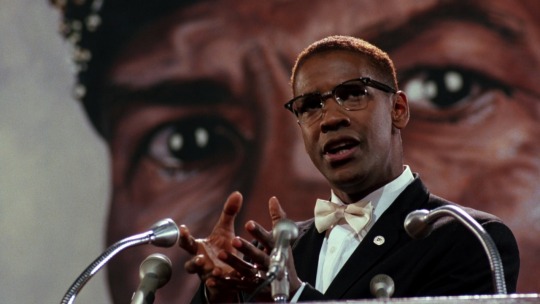
1. Malcolm X (1992)
For everything that Do the Right Thing did for Spike Lee and those involved in the production, the monumentally powerful biopic Malcolm X did all of that while also managing to humanize, canonize and create and icon out of a man that America tried its best to demonize. The masterful hand that Lee used to direct this film shows, as this film is the most ‘every frame a painting’ in his canon. Everything from the period costuming to the locations to the dance numbers to the cinematography absolutely leaps off of the screen. The editing is kinetic, the performances are full of life and depth, and the narrative does just enough going forwards and backwards to make proper connections without beating it over the head of the viewer. The respect shown to Malcolm X is massive, so much so that almost seemingly overnight, Malcolm X went from being a feared and often heavily criticized sign of aggressive blackness to a commercial commodity and household name, with the famous X suddenly adorning t-shirts, baseball caps and necklaces of all American youth, not just minorities. The impact of this film was so immediate that many schools held field trips for viewings, which further cemented the immediate and historical value of the film. Often, the connotation of saying someone ‘peaked’ for a film so early in their career would be negative, but the heights to which Malcolm X achieved on all fronts meant that even if the rest of Lee’s career was a steady decline (which it certainly wasn’t), he more than likely still would have ended up in a pantheon far above that of the average director.
With projects reportedly in the early stages of development, it doesn’t look like Spike Lee has any plans on stopping anytime soon. I certainly owe it to myself to see the handful of his films and documentaries that I’ve not seen yet... who knows, perhaps I may even go back one day and add the documentaries into the list, or find a surprise gem in one of his more recent movies I’ve yet to see.
#ChiefDoomsday#DOOMonFILM#SpikeLee#JoesBedStuyBarbershopWeCutHeads#ShesGottaHaveIt#SchoolDaze#DoTheRightThing#MoBetterBlues#JungleFever#MalcolmX#Crooklyn#Clockers#Girl6#GetOnTheBus#HeGotGame#SummerOfSam#Bamboozled#25thHour#SheHateMe#InsideMan#MiracleAtStAnna#RedHookSummer#Oldboy#DaSweetBloodofJesus#ChiRaq#Blackkklansman#Da5Bloods
17 notes
·
View notes
Text
13 Keys to the White House: UPDATE
The original post can be read here, I wrote it a day before George Floyd was murdered, and the political landscape has shifted SO MUCH since then.
There are 13 questions that define which party will win the presidential election based on how well the incumbent and challenging parties have fared over the last four years. The incumbent party needs 8 out of 13 to be true to win, while the challengers need 6 or more to be false. As of May 25, it stood, in order of severity
FALSE
FALSE
FALSE
Almost certainly false
Probably false
Maybe false
Unclear
Maybe
Maybe true
True as of right now
TRUE
TRUE
TRUE
Biden and Trump both has 3 solid keys in their field, with three more teetering on either side, and one tossup in the middle. It was anybody’s game, though Biden had a slight edge because he only needs 6 to Trump’s 8.
Not everything has changed in the last week, but just enough to solidify some of the less certain keys
Party Mandate: After the midterm elections, the incumbent party holds more seats in the U.S. House of Representatives than after the previous midterm elections. FALSE (Democrats won more in 2018 than Republicans won in 2014)
Contest: There is no serious contest for the incumbent party nomination. TRUE (Donald Trump faces no real challengers)
Incumbency: The incumbent party candidate is the sitting president. TRUE (barring the coronavirus, or a heart attack brought on by all the fast food he eats, Donald Trump will be the nominee this November)
Third party: There is no significant third party or independent campaign. TRUE (Amash has dropped out, and the Libertarians have nominated a nobody who chose an even smaller nobody as her running mate. But then again, the election is 5 months away, which in 2020-months is approximately 9000 years away; a lot can change between now and then. I mean, just 5 months ago the coronavirus hadn’t spread outside of China yet. Maybe a conservative spoiler will gain traction. Maybe some disillusioned republicans will rally behind a write-in candidate. Maybe an asteroid hits and we all have to move underground and evolve into C.H.U.D.s to survive. Anything goes in 2020. Blow on them dice, LUCK BE A LADY)
Short-term economy: The economy is not in recession during the election campaign. FALSE (The Great Shutdown, the second once-in-a-lifetime economic collapse in less than 15 years. We’re only four months into it right now; things are going to get so much worse before they get better.)
Long-term economy: Real per capita economic growth during the term equals or exceeds mean growth during the previous two terms. Almost Certainly False (Unemployment continues to rise at record breaking levels. Civil unrest is widespread in all 50 states, several territories, and even international cities in solidarity with the cause. The pandemic is far from over, and we are on the verge of a second wave.. There’s no chance in hell the economy will grow this year. 2020 is the Spiders Georg of years; it is a statistical outlier, it’s so low it’ll bring down the rest of the whole term, wiping out all growth since 2017. I mean, Republicans wanted trump to run the country like one of his businesses, and he’s giving them exactly what they wanted. This is his MO; run it into the ground, declare bankruptcy, don’t pay anyone, move onto your next failed project. Same shit as always)
Policy change: The incumbent administration effects major changes in national policy.Unclear (He hasn’t kept many of his campaign promies, but he has enriched himself and his colleagues, abusing the power of the executive for personal gain, which is a pretty major change. This key will come down to the Supreme Court decisions on his tax returns; if they decide in favor of the president, they are saying that he doesn’t have to obey subpoenas anymore, expanding the powers of the president and getting rid of legislative oversight, checks and balances; this would be a HUGE policy change akin to declaring him a king, as it would mean he is no long capable of being held accountable for anything. If they decide against him though, a lot of skeletons will come bursting out of his closet, which may or may not damage him politically. Let’s be honest, they won’t. Nothing ever does. The tax returns could reveal that he has been paying a Russian company called “WE MEDDLE, YOU WIN, GUARANTEE” for thirty years, and he and his cronies will still spin it as a positive thing. Nothing ever hurts this guy, so I wonder why he even gives a shit about hiding his taxes anymore. All we know is that he has to be hiding something BIG if he’s going this far to try and cover it up, Could this take him down? Probably not, but fingers crossed.)
Social unrest: There is no sustained social unrest during the term. FALSE (I made this post before the George Floyd protests began, but there’s no ambiguity about it now. The cracks in the system have been expanding for years, and now the dam has finally burst. And rightfully so; riots are the language of the unheard. My only concerns are that if the protests continue into November, a bunch of republican lawmakers are gonna use it as an excuse to stop people from voting. ”Curfew begins at 8PM, anyone still in line at their polling places will be arrested and/or shot”)
Scandal: The incumbent administration is untainted by major scandal. FALSE (there’s only so much you an handle before you drop all pretenses and say “this is no longer subjective, this is objectively scandalous.” Everything they do is designed to get as big a reaction as possible, they pick the objectively worst people and take the objectively worst positions on everything because they’re trying to stoke controversy. Russia, Ukraine, carrots and potatoes. The real meat are all the domestic scandal. Turning off the White House lights and hunkering in a safe space underneath it like PUNK ASS BITCH? Mobilizing the National Guard around the country? Teargassing protestors so he can pose with a Bible he’s never read in front of a church he’s never attended, holding it up like it’s some annoying obligation of his, “see? See, I like the Bible. Look, I’m holding it up. Why would I be holding it up if I didn’t just LOOOOOVE it? Can everybody see? I’m holding it out at arms length and waving it back and forth just to make sure all the cameras know, I want then to get a good shot of it. I will shortly give it to an aide and be taken home in my limo, at which point I will forget the Bible exists because my brain is turning to jelly and I’ve lost the concept of object permanence.”)
Foreign/military failure: The incumbent administration suffers no major failure in foreign or military affairs. Maybe (on the one hand, Iran didn’t retaliate when we killed their general, but on the other hand we retreated out of Syria, let thousands of ISIS fighters go, and aided the Turks in a Kurdish genocide. The tit-for-tat sanctions against China threatened to crash the global economy, but then the coronavirus came in and did that all by itself, so it’s unclear whether we’ve “failed” or simply “not succeeded.”)
Foreign/military success: The incumbent administration achieves a major success in foreign or military affairs. Maybe false? (for the same reason as above, it is hard to judge what is or isn’t a success. USMCA is unpopular and small potatoes. The North Korean talks are all show with no substance; Kim will never get rid of his nukes. We’re still caught up in W’s endless wars, and I don’t see an end in sight, so I’d say this is definitely not a success. I have no doubt in my mind the October Surprise is gonna be another bombing in Iran to kill the ayatollah. The Iran War will start on November 3, same day as the election, there will be the first draft since Vietnam, a bunch of POCs will be forced into the military as cannon fodder; it’ll be a bloodbath for both sides)
Incumbent charisma: The incumbent party candidate is charismatic or a national hero. FALSE (Trump is revered as the Second Coming of Christ by his base, but they make up less than 40% of the total country; other Republicans tolerate him at best, and all Democrats hate him. He has never had majority approval, he will never go down with the likes of the universally beloved Washington, Lincoln, and the Roosevelts. The most surprising thing of the last six months has got to be the emergence of the Lincoln Project, a coalition of Republicans who have finally grown spines, guts, and balls to stand up against trump and actively campaign against him. He doesn’t have total party control anymore, the Republicans are eroding, though to be fair the Democrats eroded a long time ago; the Republicans are a crumbling cairn, longstanding but now weakened and in danger of falling over, while the Democrats are a nice gravel walkway that everyone steps on and complains about even though the walkway is a nice addition to the park; it really ties the negative space together, linking the tennis courts with the pull-up bars. I’ve lost the thread of this analogy)
Challenger charisma: The challenging party candidate is not charismatic or a national hero. TRUE (Joe Biden is the Walter Mondale of Al Gores. Republicans hate him, even though he’s a moderate an would almost certainly try to reach across the aisle to compromise with them. Which is exactly why about half of Democrats don’t really like him; he’s too moderate and would work with Republicans. He’s old and senile, he keeps making gaffe after gaffe after gaffe, and doesn’t seem to know how the game is played anymore. Someone needs to find Grampa a nice home so he can retire and talk to his nurse about how he used to get into fist fights with ne’er-do-wells, “buncha malarkey, I tell ya”)
This gives us, from best to worst:
FALSE
FALSE
FALSE
FALSE
FALSE
Almost Certainly False
Maybe false
unclear
Maybe
TRUE
TRUE
TRUE
TRUE
Incumbent Trumps needs 8 true to win. Challenger Biden needs 6 false to win.
Biden definitely has 5, he only needs 1 more to claim it, and there are two good keys that are leaning heavily in his favor; trump’s long-term economy is in the tank, and he hasn’t had any victories overseas. Biden has this one in the bag [don’t grow complacent, there’s still plenty of fuckery to be had from here to November]
Trumps would need to flip four keys to win, only one of which leans in his favor, one is unclear, and two are in Biden’s court. The economy is in ruins, he hasn’t set up any real domestic Trump Doctrine, and the military has neither succeeded nor failed in any meaningful way these last four years. He’s going into November with a major disadvantage, perhaps the only time in his life he has ever not had an advantage.
But then again, there’s always the possibility that it could be a 2000/2016 repeat, where Biden wins the popular vote but Trump ekes by with the electoral college victory yet again. This model doesn’t take that into account because the popular vote winner almost always wins the EC too.
Trump is not more popular today than he was 4 years ago. He’s never had majority approval. While his base loves him more now than ever, they represent a minority of voters, and pretty much everyone else hates him. Anyone who was on the fence in 2016 is definitively over the fence in 2020. If he “wins,” it’s not going to be a 1972/1984 blowout, that’s just not gonna happen, too many states hate him too much. It will be very close; I will not rule out the possibility of a 269-269 tie in the electoral college, triggering a contingent election where the House of Representatives has to pick the president. Democrats have a majority in the House right now, but in contingent elections they don’t vote as 435 individuals, they vote as 50 state blocs; even though there are more Democrats than Republicans, they’re packed together into as few states as possible, giving Republicans over 26 stateside majorities, enough to ensure they would pick Trump in a contingent election.
It’s a bullshit system, and I pray it doesn’t come to that.
#allan lichtman#13 keys to the white house#13 keys#white house#election#presidency#2020 election#joe biden#biden#donald trump#trump#biden 2020#predictions#political
15 notes
·
View notes
Photo

“Speak up where you can, and Act where you can’t”
For as long as this country’s democracy stood, our people — the Filipino people — have, sadly, always been struck with issues that threaten (and have succeeded) to take away the independence and freedom that our forefathers fought so hard for. 300 years ago, our voices were taken and we were silenced by the Spanish colonizers who reaped our natural resources and left us a second-hand culture shaped to their liking. A few years later after that, it was the American colonizers who took hold of our government, albeit in a subtle yet still gravely influential way, ever present in the way we think right at this moment. The most obvious impact of both conquests: our colonial mentality. Just when we thought we were free, World War 2 came and the Japanese conquered our country yet again in their race to gain power over their neighboring countries and become one of the most powerful forces in the entire world. I believe you think it would not get worse than that, but unfortunately, in the early 70s, some of our basic rights were stripped away due to a dictatorship that fed the greed and ego of our then-president, Ferdinand Marcos. And unfortunately now, in this present, we are on the verge of being shut off again as our current leaders do whatever they can to remain in position and acquire even more power than they already have despite this alarming pandemic we are facing right now, and what’s worse is they are doing right in front of our faces.
During all those times, we were voiceless, silenced and basically rendered inferior to them. But the one thing (or technically, two things) that remained common among all those unfortunate happenings, were our hope for a better future and our will to keep fighting, to regain back the the freedom that was taken from us. In every single time, there was always a group of brave, sharp people who were uncaring of the grueling consequences that their defiance would bring. Back then, they had successfully influenced the common people and inspired them to fight for what they know they deserve: independence and freedom. Together, everybody spoke out against the tyranny, the mistreatment, the abuse; and every single time an encounter would happen, the good guys a.k.a. the citizens would always win. See, they know that they wouldn’t win against the bad by using force and violence, and so, they utilized the one weapon that they thought was taken but was actually just dormant inside of them due to the forced submission: their voices.
And now, you wonder how was communication involved in all of this. How was it involved?
By Murphy, Hildebrandt and Thomas’ definition, communication is a process of transmitting and receiving verbal and non- verbal messages. It is considered effective when it achieves the desired response or reaction from the receiver. And this is exact transaction that happened when the Filipinos fought against the oppressors by using their voices. They took it upon themselves to speak out collectively about what they knew was wrong in the then-current leadership and demanded proper accountability for the damages they did against our people. Through speaking out and exposing the oppression that they bore in a total of hundreds of years, it got the desired reaction which was the Filipinos subsequently having a better, though not perfect, government than that of the oppressors’. They protested, they exposed, and they fought relentlessly for the independence, freedom and rights that were stripped away from them.
This ties in to the current happenings in the country. Aside from the questionable actions that were done, the certain bills that were passed and the other forms of injustice that were done to our nation, the Filipinos have already noticed what is wrong with the government’s response towards the coronavirus pandemic, which led them to speaking out about the issues, problems and lackings that they have obviously seen and felt. While I am not sure if I am allowed to be specific (due to a certain law,) Filipinos have again raised their voices to spread awareness of the possible (and some, already present) abuse and mistreatment that would be brought by what the government is doing now. Of course, even if the people did it and are doing it amid the pandemic, they are doing it safely, properly and legally, always making sure that their actions are safeguarded by the guidelines that were put by the same government that is doing wrong by us right now, while listening to the opposition’s opinions and thoughts to allow them to understand where the opposition is coming from, to say the least.
This is why communication matters. Disseminating our different opinions, perspectives and thoughts about certain matters will balance out the proverbial scale that tips in favor of the bad and allow the good to outweigh it. It allows us to be heard. It allows the people to form an opinion of their own and possibly side with what they think is right. It allows those in charge to be enlightened that what they are doing isn’t right for the people anymore. It allows everybody to be informed of current issues that will, sooner or later, impact their life in either a big or small way. Moreover, communication brings us, a whole nation, together to see to it that the betterment of our state is delivered and justice is properly served.
So the next time you wonder why communication is important, just remember that our ancestors used it as their main, powerful weapon to fight for what is right and just, and retain the rights, values and treatment that we deserve.
2 notes
·
View notes
Text
0 notes
Text
Would You Rather (revisited 5 yeas later)
Pierce your nose or your tongue? - nose tongue
Drink whole or skimmed milk? - whole skimmed, or unsweet almond
Die in a fire or drowning? - drowning (that way i might have a better chance of being reincarnated as a mermaid)
Spend time with your parents or enemies? - enemies (perhaps they’d be less conservative) parents (they’re actually not conservative, I was just angsty)
Are You?
Single or in a relationship? - untouchable VERY happily in a committed relationship with my absolute soulmate
Straight, gay, bisexual, other? - ace/aro "not straight”
Tall or short? - medium???
Right handed or left handed? - left
A lover of music or a lover of books? - music
Do You Prefer
Flowers or sweets? - sweets (preferably raspberry chocolate) flowers (because they’re gorgeous, and I can dry them once they start to fade and keep them even longer)
Color photos or black-and-white photos? - depends
Sunrise or sunset? - swiftly fly the years~ (sunset)
M&Ms or Skittles? - m&ms (skittles are kinda gross)
Staying up late or waking up early? - staying up late
Sun or moon? - moon sun
Winter or Autumn? - on the verge of when autumn turns to winter, when the leaves are set ablaze with vibrant crimson and auburn, right before they fall and litter the ground, when the air turns crisp and fresh, and the wind sends a chill so gentle yet promising that your entire body shivers with anticipation of the coming frost autumn, you poetic little shit <3
10 acquaintances or 2 best friends? - 2 best friends (for sure)
Rainy or sunny? - rainy (but only when it’s not on a day i need to travel by foot or be outdoors) sunny
Vanilla ice cream or chocolate ice cream? - vanilla (because you can add other things to make it taste like different things)
Vodka or Jack? - JACK (shit, i have a problem) neither (i’m allergic to alcohol now :-) )
About You
What time is it? - 9:22 10:08pm
Name? - Grace / NP / Priest (maybe) ((idk))
When is your birthday? - January 21
What do you want? - to be able to speak the ancient languages, to swim the deepest depths of the ocean alongside forgotten creatures, to know the old ways of magic, and to get some goddamn facial piercings and a shot of whiskey for this damn pandemic to go away so I can see my sweet boy!!
How many kids do you want? - ew none
What would you name a girl? - idk
What would you name a boy? - idk
You want to get married? - not really? (i kinda just want the wedding but not the marriage) YES PLEASE I LOVE MY BABY SO MUCH I just wanna be with him forever
Unique
Are you double-jointed? - haha no
Can you roll your tongue? - haha no
Can you raise one eyebrow? - either the left one individually or both at the same time (the right side of my face is incapable of doing anything independent)
Can you cross your eyes? - i guess?
Random
Which shoe goes on first? it doesn’t really matter
Ever thrown something at someone? - probably yes
On average, how much money do you carry with you? - like none i hate carrying anything who knows it varies
What jewelry do you wear? - occasionally some earnings or a necklace (and sometimes the ring my sister gave me)
Do you twirl or cut spaghetti? - twirl
Have you ever eaten Spam? - no
Favorite ice cream? - pink mint buT THEY DON’T MAKE IT ANYMORE
How many kinds of cereal are in your cupboard? - 1 (and its my parents’)
Last
Car ride? - earlier today
Song played? point point - life in grey tyDi & MORTEN ft. Cameron Walker - Sharpest Weapon (SAME PLAYLIST I really am feeling nostalgic, i didn’t even plan that)
Time you cried? - about a week ago just now from doing this because i’m so happy
#personal#feeling nostalgic#so i went looking through my old posts#so now i'm gonna revisit this and see how ive changed#:')#I'm glad younger me grew to be happier than she thought she'd be#2015-2020#i can't stop smiling#so much has changed but a few core personality traits are still the same#6.29.20
0 notes
Text
Happy Mother’s Day

“Mothers hold their children’s hands for a short while, but their hearts forever.” —Unknown
Mothers deserve to be celebrated every single day and showered with love always. We are so grateful for all of the mothers that make Columbus and TSG all that it is. We asked some of our members to share their favorite things about their mothers & about being a mothers themselves - and we are absolutely loving their sweet answers!

Autumn Pochiro with Autumn Dawn Inspired Design
The thing I admire most about my mother:
“What I love and admire most about my sweet mom is she's always smiling even when the world around her looks bleak.”
The greatest advice my mother has given me:
“Everyone deserves a second chance. That's what love is a chance.”
The biggest lesson I have learned about myself since becoming a mother:
“Being a mom is the greatest gift. The love of my daughters makes my world whole yet makes me question every decision. The job of being their moral and spiritual compass until they know their own heart makes me want to be a better person daily.”
The thing I love most about being a mother:
“Quality time spent with my girls I am always amazed at the way they love, dream, and play. Even as teens, they have this beautiful view of humanity. Grateful, to have their unconditional love.”

Jennifer Heck with Dr Robert Heck-Columbus Aesthetic and Plastic Surgery
The thing I admire most about my mother:
“My mother had the patience to do it all. She was a full time middle school teacher while raising 5 kids and we always felt well cared for. She had to have been pulled in so many directions but yet all us children never wanted for anything. Probably the most admirable attribute about my mom however is her ethics and kindness, she truly always does the right thing and is caring to all she meets!”
The greatest advice my mother has given me:
“The greatest advice my mom gave to me was to give myself a break. I often want to succeed at multiple things at once and am hard on myself if i don't believe I'm achieving a certain level of success. I have learned that I can't be the best at home, work, my work outs, taking care of the kids and my husband all at once, I need to forgive myself for having balance and accepting my definition of "best" doesn't mean I'm still not succeeding.”
The biggest lesson I have learned about myself since becoming a mother:
“The biggest lesson I have learned about myself becoming a mother is realizing that I need to be flexible. Just because I want things, behaviors, goals for the kids to be a certain way doesn't mean it's the only path it will take.”
The thing I love most about being a mother:
“The thing I love most about being a mother now that my kids are 17 and 19 are the simple things like family dinner, knowing they are asleep in their rooms at night, or making them breakfast in the morning. The transition from infant to teen goes so fast, I've enjoyed it all but what also brings me joy now is seeing them be independent and thinking through things themselves to better prepare for adulthood!”

Erica Fullen with The Wild Sage Collective
The thing I admire most about my mother:
“Her creativity. My mom has an amazing eye for design and can make any space look beautiful.”
The greatest advice my mother has given me:
“Being one of 3 daughters and having 3 daughters myself, my mother has always told me to choose my battles. Do you want to be right or do you want peace is a question I often ask myself when I find myself on the verge of a "battle" with my daughters.”
The biggest lesson I have learned about myself since becoming a mother:
“I have learned what it feels like to have my heart on the outside of my body.”
The thing I love most about being a mother:
“Being a mother constantly challenges and motivates me to show up as the best version of myself.”

Fiona Miller with Fiona Miller Art
The thing I admire most about my mother:
“My mum is a natural giver: she is always ready to love on and serve others!”
The greatest advice my mother has given me:
“This advice has come more through example than words, but she has taught me the value of hard work and determination. So much can be accomplished by just tackling one thing and then the next.”
The biggest lesson I have learned about myself since becoming a mother:
“I am not a very patient person!!! (I'm still learning this one.....)”
The thing I love most about being a mother:
“It has taught me so much about my faith: the depth to which I love my children simply because they are mine, helps me understand how much I am loved by God.”

Francesca Festa with Dragonfly Counseling and Wellness
The thing I admire most about my mother:
“Self-care. I have seen my mother take care of her body and her mind with consistency and balance through her whole life with yoga, massages, an healthy diet and her personal skin care routine. I always admired it and I witnessed the benefits. I came to appreciate her lifestyle even more when I became a working mom and following in her footsteps helped me gain balance and maintain sanity. And of course, her teaching had a great impact on my job as a wellness counselor!”
The greatest advice my mother has given me:
“My mother had to work full time when I was growing up and I remember her job was not always the best fit for her. However, she dutifully went to work everyday until she retired, without ever complaining. She taught me a sense of responsibility and commitment. At the same time, she always encouraged me (and in fact made it possible for me) to follow my passions.”
The biggest lesson I have learned about myself since becoming a mother:
“Becoming a mother taught me the importance of slowing down and learning to be present. I am practicing being mindful and offering my children undivided attention for a certain period of time. Although it can be really challenging, I intentionally take some time every day to turn off my phone and just be with my kids without distractions. I do it both for them and for myself.”
The thing I love most about being a mother:
“Spending time with my kids I rediscovered the joy of playing. I love sitting on the floor with them or getting messy with art projects. Playing with them allows me to connect and teach them new skills to help them grow. At the same time, playing gives me an opportunity to be creative, relieve stress, and be in the moment.”

Abigail Fredelake with The Scout Guide
The thing I admire most about my mother:
“Her energy, love for life, and how everyone she meets becomes a friend.”
The greatest advice my mother has given me:
“Life is short, so live it to the fullest and don't take things too seriously.”
The biggest lesson I have learned about myself since becoming a mother:
“The amount of love I could have for my son.”
The thing I love most about being a mother:
“The smile he gives me when I walk into a room is the absolute best.”

Paxton Hood with The Scout Guide
The thing I admire most about my mother:
“Her strength, resilience, and grace through the difficult times will never not amaze me. She is patient and calm through all things and loves with her whole heart. I can only hope when I am a mother someday that my children feel as loved and supported as I do every day from my mother.”
The greatest advice my mother has given me:
“Control what you can and don’t dwell on things you cannot - I can get a bit dragged down by my desire to control things and discouraged when I cannot. She always reminds me that it is okay to let things go a little, breathe, and give myself a bit of a break. It is okay to not have it all together – learning that more than ever with this pandemic!”

Mara Ackermann with Ackermann & Associates
The thing I admire most about my mother:
“Her independence, she always has been self-sufficient and has relied only on herself.”
The greatest advice my mother has given me:
“Expectations are resentments waiting to happen”
The biggest lesson I have learned about myself since becoming a mother:
“My daughters watch everything I do- my actions need to have accountability and character”
The thing I love most about being a mother:
“Seeing the world through the eyes of my children who have no judgement and everything is new and exciting.”

Allison Leonard with Kismet Visuals
The thing I admire most about my mother:
“Is how she has always 1000% provided for our family, not financially necessarily but she shows her love so well in all the other ways. I wish I was half as good as her in the kitchen too”
The greatest advice my mother has given me:
“Be the bigger person AND if you don’t have anything nice to say don’t say anything at all.”
The biggest lesson I have learned about myself since becoming a mother:
“That nothing hurts more than seeing your children hurting and although I would do anything to take away their pain I also know part of life is pain and letting them grow and learn from that pain is important.”
The thing I love most about being a mother:
“The hugs and kisses and the way they truly love me unconditionally.”

Jenn Teitt with Bellepoint Company
The biggest lesson I have learned about myself since becoming a mother:
“Being a mother has taught me every day about God's love for me. In the same ways I care for, nurture, protect, and guide Charlie, I know God cares for, nurtures, protects, and guides me.“
The thing I love most about being a mother:
“Waking up every morning is kind of like Christmas. I'm excited to see his bright smile, hear his sweet voice, and feel those little arms wrap around my neck. Every day is ten times better because of Charlie.”
0 notes
Text
Maher to Pelosi: Spending Money That Doesn't Exist Could End Up Hurting More People Than The Coronavirus Posted By Ian Schwartz On Date April 25, 2020
Bill Maher, host of 'Real Time' on HBO, interviewed Speaker of the House Nancy Pelosi about the amount of money Congress has appropriated for coronavirus relief. On Friday's broadcast of the show, Maher said if we continue to write checks for money that doesn't exist it could wind up hurting more people than the virus.
Pelosi said she viewed the record-breaking spending bills as "an investment" and a stimulus to the economy. Pelosi likened the spending to the food stamp program, calling that an investment and stimulus.
BILL MAHER, HOST: Okay, you mentioned that this is fourth bill you’ve passed. I think the total now is coming up on $2.7 trillion. That’s a lot of money, you know, in a very short period of time. I know Congress controls the purse strings. I can’t imagine there’s much left in the purse. I just don’t get it. I don’t understand how – I know we can bailout certain sectors, as we have done in the past. I don’t know how you can just keep indefinitely writing checks. We were $20 trillion in the hole to begin with. And all world governments, who are already in debt, are doing this. How can the whole world be writing this funny money?
SPEAKER NANCY PELOSI: Well, because it’s a matter of life and death. Nobody made as big of a fuss as we did when they passed the nearly $2 trillion tax break for the wealthiest people in
our country, 83 percent of the benefits going to the top one percent and a debt that they laid on our kids to pay for in the future.
So, this is more of an investment in the lives and the livelihood of the American people, and we have to think big about that. The more we invest in science and health, the quicker our economy will recover from the pandemic.
MAHER: Well, it will recover unless people get wise to the fact we’re just writing checks for money that doesn’t exist. I mean – what is the point of bailing out banks who are just going to loan back the money that doesn’t exist to us again? It seems like it’s a house of cards that could, in the end, wind up hurting more people than the disease.
PELOSI: Well, the point is to keep people working. It is paycheck protection. And so, the point of these bills – this legislation for the – they call it Paycheck Protection Program – is that the small businesses would be able to have some relief. And if they kept their workers on, then We were concerned when they asked for more money right away. We said, ‘Wait a minute. We want to make sure – we want to see the data.’ Data that we have seen anecdotally, not scientifically yet. It’s telling us that many low – shall we say – underbanked communities are not getting any of this money. Whether it was women, minority owned businesses, Native Americans, veterans, rural communities, et cetera, were not getting these loans, because they just didn’t have banking relationships that were putting them higher up in the line – further up in the line.
And so, it is probably – well, it is an investment. It is stimulus to the economy, hopefully when that comes. It is not anything in comparison to the irresponsibility of a tax cut – almost $2 trillion when you count the interest on the debt – that all of the deficit hawks, fiscal conservatives didn’t even give one ounce of thought to.
The fact is, we expect a return on this money. When we invest in food stamps, that’s stimulus. When we invest in Unemployment Insurance, that’s stimulus. When we give a direct payment, that’s stimulus. And hopefully, when we keep these people in their jobs – and that was the point of small business – but also, the assistance to the aerospace industry, the airline industry, like that, the point is they keep the people in their jobs. And therefore, they have paychecks, and therefore, they can – people can survive.
It’s a tough time, because their lives are threatened, as well as their livelihood. As well as our democracy, I might add though. We’re going to add the money in there for elections, for direct voting.
_________________________________________________________
OPINION: Nancy Pelosi is sick. Just look and listen to her, she can barley complete a sentence without ‘twitching and shanking’. Her mental capassity is almost gone. She’s to mentally ill to remain in Congress as House Speaker.
Nancy Pelosi is on the verge of a ‘nervous breakdown’. She has done so much ‘evil’ to the American people that its catching up with her. Someone in her party need to take her aside and suggest that she get a mental check-up/evaluation from an independent physician rather than her own, so that the results of not bias/manupulated, before she can return to Congress that states that she is mentality healthy enough to return to work.
Because this women, (Nancy Pelosi) differently have a mental condition that’s working against her capacity to be the leader of the House in Congress. Maybe someone on her team can replace her until to get a ‘clean’ bill of health.
Just our thoughts!
0 notes
Text
Bitcoin Price Correlates With Traditional Assets, but Not Entirely
Since coming to power back in 2016, President Trump seemed to have reinvigorated the United States stock market after it showed signs of slowing down throughout the first half of the previous decade. Just three weeks ago, the American market witnessed a combined gain of 58% compared with the last three or so years. However, following the World Health Organization’s recent declaration of the novel coronavirus pandemic on March 11 — with the independent research body citing 118,000 cases and more than 4,000 deaths globally — this rosy picture seems to have reversed almost overnight.
Additionally, ever since news of the medical emergency went live, markets all over the world began to crash at an unprecedented rate, with powerhouse economies such as Australia and India already gearing up for a period of heavy recession.
Not only that, regular office work all over the world has also been disrupted quite heavily — with many companies choosing to adopt work-from-home policies, seriously affecting global supply chains and causing many high-profile public events and major conferences to be cancelled.
The virus effect
In the midst of all this, Bitcoin (BTC) has been on the receiving end of a lot of bearish pressure, with the premier crypto asset falling from $10,000 on Feb. 24, down to $4,800 by March 12. More specifically, Bitcoin’s value slid by more than $3,000 after New York State Governor Andrew Cuomo released a public statement issuing a medical emergency, thus sealing off a one-mile containment area around the NYC suburb of New Rochelle.
Despite the apparent link between BTC’s price drop and the ongoing market slump, some experts believe that the flagship cryptocurrency’s slide has more to do with the recent PlusToken dump and other internal factors rather than the prevailing coronavirus-induced market scare.
Regarding the matter, Bill Herrmann, CEO of alternative investment banking firm Wilshire Phoenix, is of the opinion that Bitcoin’s current negative movement can largely be attributed to the instability of the traditional market. On the subject, he opined: “In times of extreme volatility, which is often followed by panic — most retail investors, whether it’s Bitcoin or in equities, sell first and ask questions later.”
A similar opinion is also shared by Mati Greenspan, founder of Quantum Economics, who told Cointelegraph that it is quite extraordinary that during this period of extreme volatility, “Bitcoin seems to be mirroring stock indices quite concisely.”
However, David Waslen, CEO of HedgeTrade — a blockchain-powered financial trading application — told Cointelegraph that while there is definitely a correlation between Bitcoin’s performance and the traditional market at large, the comparisons are quite limited in nature since a number of niche variables make BTC totally different. Waslen added:
“Bitcoin’s price did react correspondingly to the stock market plunge recently, and continues to correlate to world news announcements. But it also does its own thing, for instance pumping on March 6th while stocks were in a tailspin. It’s also affected by things that have absolutely nothing to do with traditional markets, such as mining, whales, and exchange hacks.”
Is Bitcoin truly an independent store of value?
With Bitcoin seemingly reacting quite strongly to the price corrections being witnessed in stocks, crude, and other commodities, it is worth exploring an answer to the question, “Is BTC really an uncorrelated asset class?”
Greenspan believes the events that are currently unfolding have served a devastating blow to a number of theories that many pro-crypto users gravitate toward whenever the price of BTC rises or falls independently of the traditional stock market:
“This price action is seemingly a damaging blow to two narratives that Bitcoin proponents tend to gravitate to. First, it is an uncorrelated asset class. And second, Bitcoin acting like the stocks during uncertain times means that it is now positioned as a risk asset rather than a safe haven.”
Similarly, Simon Peters, analyst for trading and multi-asset brokerage company eToro, believes that the aforementioned correlation is primarily being witnessed due to the ongoing pandemic underlying the traditional and crypto markets. On the subject, he told Cointelegraph during the London Blockchain Week:
“With coronavirus, it’s not a geopolitical issue as such. It’s a global pandemic. That’s where I think the argument for crypto is, in that area where we see a change in the monetary policy of central banks or an increase in liquidity in the markets.”
Lastly, Brian Hankey, co-founder of Cache, a provider of gold-backed tokens, told Cointelegraph that while gold and silver may be looking at short-term losses, in the medium-to-long term, they will continue to be looked at as good investment avenues. Additionally, he further pointed out that owing to the various industrial use cases associated with silver, the precious metal has a lot of potential upside.
Covid-19 has heavily skewed market indicators
Despite Bitcoin showcasing a mild tendency to start tracking traditional markets from time to time — if not testing some sort of relative correlational patterns — cryptocurrencies are still widely perceived to be a unique kind of uncorrelated, asymmetrical asset class.
However, since a flow of value to crypto has to occur from traditional markets, there is quite obviously a link there. On the subject, Glenn Benavides, co-founder of the Global Crypto Alliance — an organization comprising of experienced professionals with expertise in business development and blockchain ecosystems — told Cointelegraph:
“We saw Bitcoin move positively together with Gold and the S&P500 in the previous months. Now we see Crypto crashing as the rest of the world crashes during the COVID-19 panic. This does not mean Crypto will start behaving as a totally correlated asset from this moment. But, we can expect some more correlation from now on, in my opinion, as Crypto is plugged into traditional markets in order to fuel them.”
Speaking on Bitcoin’s role as a store of value that could rival conventional safe havens such as gold and silver, Jaian Cuttari, CEO at financial services ecosystem BDAM Foundation, told Cointelegraph that Bitcoin has failed to live up to its expectations, since many from within the crypto community believed that while markets all over the world were sliding, the premier digital currency would be able to weather the storm and thus serve as the perfect long-term investment vehicle for many, adding:
“It simply is not a viable investment as many had believed. Bitcoin is very controlled by a few groups of large holders. This puts Bitcoin at greater risk of rapid value loss. This can be seen by the $30 billion dollar wipe out on btc market cap in 3 days. This is not normal and shows sophisticated sell offs from high volume holders are bringing btc to historic lows once again.”
Lastly, it bears mentioning that up until March 8, Bitcoin had managed to hold onto most of its value amid the sharp sell-off in equities, oil and most other markets. The only other commodity that proved to be more resilient was gold, with the precious metal trading near its seven-year high levels recently.
The broader cryptocurrency market finally saw a steep liquidation on Thursday and Friday when most digital currencies saw a downward correction of 20% to 40%. Ultimately, Bitcoin has followed the rest of the financial markets lower in response to the coronavirus crisis, albeit with a lag time of about two weeks.
Is a global recession right around the corner or are we in the midst of one?
Even before the threat of Covid-19 started to disrupt supply chains all over the world, there was a looming fear that the global financial system was on the verge of a full-blown recession. Now that the coronavirus has forced a number of markets to slow down considerably, a whole host of experts believe that the effects of a global economic slowdown are starting to show.
Expounding his views on the matter, Hankey is of the opinion that there is a strong possibility that a recession-type scenario could be real as “It’s clear that the global financial system is extremely overburdened by debt,” due to the fact that years of low-interest rates have fuelled clearly reckless malinvestment, adding:
“Many stocks have obscenely high P/E ratios (if they have any earnings at all). It’s unclear what the catalyst will be or if it has occured yet. It may or may not be the Coronavirus. In any case, I think it’s hardly controversial to say that we’re long overdue for a major recession.”
It is also important to point out that the Federal Reserve’s recent $1.5 trillion liquidity injection into the market — after Wall Street circuit breakers went off twice this week — seems to be a clear signal that the coronavirus panic is being taken seriously and a global recession might be around the corner.
However, not everybody seems to agree with the hypothesis that a bear market is here to stay. In this regard, Cuttari believes that as things stand, it is the virus scare rather than a market recession that is causing all of the ongoing economic chaos. Similarly, Benavides also is of the opinion that a relative crisis that is affecting some networks of institutions and traditional organizations, but not a global recession per se:
“I don’t see a real recession, but many new powerful groups replacing the old ones, as new forms of value take the place of the traditional ones. In my opinion, Bitcoin and crypto will fuel a big portion of this revolution.”
What does the future hold for the crypto market?
With central banks all over the world lowering benchmark rates en masse and steering toward negative interest rates, it may be hard to think positively about the world economy at the moment.
However, unlike other times in the past when the only way out for the masses was to depend on traditional monetary systems, this time around there is an option to turn to the crypto market. The crypto ecosystem serves a global audience and has provided the masses with peer-to-peer trading capabilities. This makes it one of a kind, especially at a time when the global economy is being faced with a potential catastrophe.
On the issue, Waslen is of the opinion that in the short-to-medium term, global markets will most likely be defined by cash infusions to industries that are currently under siege. He also believes that with precious metals continuing to showcase steady growth as stocks fall, Bitcoin too will rise and fall with the same macro events affecting traditional markets along with other factors like the upcoming halving.
Greenspan, on the other hand, told Cointelegraph that the events that are currently unfolding are showing the global crypto community at large that Bitcoin was never designed to be a solution for an economic decline and thus its future in relation to this ongoing crisis is still not fully clear:
“Bitcoin was invented as an alternative to fiat money, which is controlled by governments and banks. So, unless the value of fiat money comes into question, I don’t see bitcoin playing any significant role.”
Lastly, Hankey is cautiously optimistic that Bitcoin has the potential to weather the storm it is currently being faced with. He believes that if Bitcoin does survive a major global recession, chances are high that its perception and overall market reputation as a legitimate financial instrument will increase even more.
Simon Peters interview was conducted by Joseph Birch during the London Blockchain Week.
window.fbAsyncInit = function () { FB.init({ appId: '1922752334671725', xfbml: true, version: 'v2.9' }); FB.AppEvents.logPageView(); }; (function (d, s, id) { var js, fjs = d.getElementsByTagName(s)[0]; if (d.getElementById(id)) { return; } js = d.createElement(s); js.id = id; js.src = "http://connect.facebook.net/en_US/sdk.js"; js.defer = true; fjs.parentNode.insertBefore(js, fjs); }(document, 'script', 'facebook-jssdk')); !function (f, b, e, v, n, t, s) { if (f.fbq) return; n = f.fbq = function () { n.callMethod ? n.callMethod.apply(n, arguments) : n.queue.push(arguments) }; if (!f._fbq) f._fbq = n; n.push = n; n.loaded = !0; n.version = '2.0'; n.queue = []; t = b.createElement(e); t.defer = !0; t.src = v; s = b.getElementsByTagName(e)[0]; s.parentNode.insertBefore(t, s) }(window, document, 'script', 'https://connect.facebook.net/en_US/fbevents.js'); fbq('init', '1922752334671725'); fbq('track', 'PageView');
Source link
The post Bitcoin Price Correlates With Traditional Assets, but Not Entirely appeared first on For Crypto.
from For Crypto https://ift.tt/3aYC1u5
0 notes
Text
Bitcoin Price Correlates With Traditional Assets, but Not Entirely
Since coming to power back in 2016, President Trump seemed to have reinvigorated the United States stock market after it showed signs of slowing down throughout the first half of the previous decade. Just three weeks ago, the American market witnessed a combined gain of 58% compared with the last three or so years. However, following the World Health Organization’s recent declaration of the novel coronavirus pandemic on March 11 — with the independent research body citing 118,000 cases and more than 4,000 deaths globally — this rosy picture seems to have reversed almost overnight.
Additionally, ever since news of the medical emergency went live, markets all over the world began to crash at an unprecedented rate, with powerhouse economies such as Australia and India already gearing up for a period of heavy recession.
Not only that, regular office work all over the world has also been disrupted quite heavily — with many companies choosing to adopt work-from-home policies, seriously affecting global supply chains and causing many high-profile public events and major conferences to be cancelled.
The virus effect
In the midst of all this, Bitcoin (BTC) has been on the receiving end of a lot of bearish pressure, with the premier crypto asset falling from $10,000 on Feb. 24, down to $4,800 by March 12. More specifically, Bitcoin’s value slid by more than $3,000 after New York State Governor Andrew Cuomo released a public statement issuing a medical emergency, thus sealing off a one-mile containment area around the NYC suburb of New Rochelle.
Despite the apparent link between BTC’s price drop and the ongoing market slump, some experts believe that the flagship cryptocurrency’s slide has more to do with the recent PlusToken dump and other internal factors rather than the prevailing coronavirus-induced market scare.
Regarding the matter, Bill Herrmann, CEO of alternative investment banking firm Wilshire Phoenix, is of the opinion that Bitcoin’s current negative movement can largely be attributed to the instability of the traditional market. On the subject, he opined: “In times of extreme volatility, which is often followed by panic — most retail investors, whether it’s Bitcoin or in equities, sell first and ask questions later.”
A similar opinion is also shared by Mati Greenspan, founder of Quantum Economics, who told Cointelegraph that it is quite extraordinary that during this period of extreme volatility, “Bitcoin seems to be mirroring stock indices quite concisely.”
However, David Waslen, CEO of HedgeTrade — a blockchain-powered financial trading application — told Cointelegraph that while there is definitely a correlation between Bitcoin’s performance and the traditional market at large, the comparisons are quite limited in nature since a number of niche variables make BTC totally different. Waslen added:
“Bitcoin’s price did react correspondingly to the stock market plunge recently, and continues to correlate to world news announcements. But it also does its own thing, for instance pumping on March 6th while stocks were in a tailspin. It’s also affected by things that have absolutely nothing to do with traditional markets, such as mining, whales, and exchange hacks.”
Is Bitcoin truly an independent store of value?
With Bitcoin seemingly reacting quite strongly to the price corrections being witnessed in stocks, crude, and other commodities, it is worth exploring an answer to the question, “Is BTC really an uncorrelated asset class?”
Greenspan believes the events that are currently unfolding have served a devastating blow to a number of theories that many pro-crypto users gravitate toward whenever the price of BTC rises or falls independently of the traditional stock market:
“This price action is seemingly a damaging blow to two narratives that Bitcoin proponents tend to gravitate to. First, it is an uncorrelated asset class. And second, Bitcoin acting like the stocks during uncertain times means that it is now positioned as a risk asset rather than a safe haven.”
Similarly, Simon Peters, analyst for trading and multi-asset brokerage company eToro, believes that the aforementioned correlation is primarily being witnessed due to the ongoing pandemic underlying the traditional and crypto markets. On the subject, he told Cointelegraph during the London Blockchain Week:
“With coronavirus, it’s not a geopolitical issue as such. It’s a global pandemic. That’s where I think the argument for crypto is, in that area where we see a change in the monetary policy of central banks or an increase in liquidity in the markets.”
Lastly, Brian Hankey, co-founder of Cache, a provider of gold-backed tokens, told Cointelegraph that while gold and silver may be looking at short-term losses, in the medium-to-long term, they will continue to be looked at as good investment avenues. Additionally, he further pointed out that owing to the various industrial use cases associated with silver, the precious metal has a lot of potential upside.
Covid-19 has heavily skewed market indicators
Despite Bitcoin showcasing a mild tendency to start tracking traditional markets from time to time — if not testing some sort of relative correlational patterns — cryptocurrencies are still widely perceived to be a unique kind of uncorrelated, asymmetrical asset class.
However, since a flow of value to crypto has to occur from traditional markets, there is quite obviously a link there. On the subject, Glenn Benavides, co-founder of the Global Crypto Alliance — an organization comprising of experienced professionals with expertise in business development and blockchain ecosystems — told Cointelegraph:
“We saw Bitcoin move positively together with Gold and the S&P500 in the previous months. Now we see Crypto crashing as the rest of the world crashes during the COVID-19 panic. This does not mean Crypto will start behaving as a totally correlated asset from this moment. But, we can expect some more correlation from now on, in my opinion, as Crypto is plugged into traditional markets in order to fuel them.”
Speaking on Bitcoin’s role as a store of value that could rival conventional safe havens such as gold and silver, Jaian Cuttari, CEO at financial services ecosystem BDAM Foundation, told Cointelegraph that Bitcoin has failed to live up to its expectations, since many from within the crypto community believed that while markets all over the world were sliding, the premier digital currency would be able to weather the storm and thus serve as the perfect long-term investment vehicle for many, adding:
“It simply is not a viable investment as many had believed. Bitcoin is very controlled by a few groups of large holders. This puts Bitcoin at greater risk of rapid value loss. This can be seen by the $30 billion dollar wipe out on btc market cap in 3 days. This is not normal and shows sophisticated sell offs from high volume holders are bringing btc to historic lows once again.”
Lastly, it bears mentioning that up until March 8, Bitcoin had managed to hold onto most of its value amid the sharp sell-off in equities, oil and most other markets. The only other commodity that proved to be more resilient was gold, with the precious metal trading near its seven-year high levels recently.
The broader cryptocurrency market finally saw a steep liquidation on Thursday and Friday when most digital currencies saw a downward correction of 20% to 40%. Ultimately, Bitcoin has followed the rest of the financial markets lower in response to the coronavirus crisis, albeit with a lag time of about two weeks.
Is a global recession right around the corner or are we in the midst of one?
Even before the threat of Covid-19 started to disrupt supply chains all over the world, there was a looming fear that the global financial system was on the verge of a full-blown recession. Now that the coronavirus has forced a number of markets to slow down considerably, a whole host of experts believe that the effects of a global economic slowdown are starting to show.
Expounding his views on the matter, Hankey is of the opinion that there is a strong possibility that a recession-type scenario could be real as “It’s clear that the global financial system is extremely overburdened by debt,” due to the fact that years of low-interest rates have fuelled clearly reckless malinvestment, adding:
“Many stocks have obscenely high P/E ratios (if they have any earnings at all). It’s unclear what the catalyst will be or if it has occured yet. It may or may not be the Coronavirus. In any case, I think it’s hardly controversial to say that we’re long overdue for a major recession.”
It is also important to point out that the Federal Reserve’s recent $1.5 trillion liquidity injection into the market — after Wall Street circuit breakers went off twice this week — seems to be a clear signal that the coronavirus panic is being taken seriously and a global recession might be around the corner.
However, not everybody seems to agree with the hypothesis that a bear market is here to stay. In this regard, Cuttari believes that as things stand, it is the virus scare rather than a market recession that is causing all of the ongoing economic chaos. Similarly, Benavides also is of the opinion that a relative crisis that is affecting some networks of institutions and traditional organizations, but not a global recession per se:
“I don’t see a real recession, but many new powerful groups replacing the old ones, as new forms of value take the place of the traditional ones. In my opinion, Bitcoin and crypto will fuel a big portion of this revolution.”
What does the future hold for the crypto market?
With central banks all over the world lowering benchmark rates en masse and steering toward negative interest rates, it may be hard to think positively about the world economy at the moment.
However, unlike other times in the past when the only way out for the masses was to depend on traditional monetary systems, this time around there is an option to turn to the crypto market. The crypto ecosystem serves a global audience and has provided the masses with peer-to-peer trading capabilities. This makes it one of a kind, especially at a time when the global economy is being faced with a potential catastrophe.
On the issue, Waslen is of the opinion that in the short-to-medium term, global markets will most likely be defined by cash infusions to industries that are currently under siege. He also believes that with precious metals continuing to showcase steady growth as stocks fall, Bitcoin too will rise and fall with the same macro events affecting traditional markets along with other factors like the upcoming halving.
Greenspan, on the other hand, told Cointelegraph that the events that are currently unfolding are showing the global crypto community at large that Bitcoin was never designed to be a solution for an economic decline and thus its future in relation to this ongoing crisis is still not fully clear:
“Bitcoin was invented as an alternative to fiat money, which is controlled by governments and banks. So, unless the value of fiat money comes into question, I don’t see bitcoin playing any significant role.”
Lastly, Hankey is cautiously optimistic that Bitcoin has the potential to weather the storm it is currently being faced with. He believes that if Bitcoin does survive a major global recession, chances are high that its perception and overall market reputation as a legitimate financial instrument will increase even more.
Simon Peters interview was conducted by Joseph Birch during the London Blockchain Week.
window.fbAsyncInit = function () { FB.init({ appId: '1922752334671725', xfbml: true, version: 'v2.9' }); FB.AppEvents.logPageView(); }; (function (d, s, id) { var js, fjs = d.getElementsByTagName(s)[0]; if (d.getElementById(id)) { return; } js = d.createElement(s); js.id = id; js.src = "http://connect.facebook.net/en_US/sdk.js"; js.defer = true; fjs.parentNode.insertBefore(js, fjs); }(document, 'script', 'facebook-jssdk')); !function (f, b, e, v, n, t, s) { if (f.fbq) return; n = f.fbq = function () { n.callMethod ? n.callMethod.apply(n, arguments) : n.queue.push(arguments) }; if (!f._fbq) f._fbq = n; n.push = n; n.loaded = !0; n.version = '2.0'; n.queue = []; t = b.createElement(e); t.defer = !0; t.src = v; s = b.getElementsByTagName(e)[0]; s.parentNode.insertBefore(t, s) }(window, document, 'script', 'https://connect.facebook.net/en_US/fbevents.js'); fbq('init', '1922752334671725'); fbq('track', 'PageView');
Source link
The post Bitcoin Price Correlates With Traditional Assets, but Not Entirely appeared first on CoinRetreat.
from CoinRetreat https://ift.tt/38Py2hG
0 notes
Text
Bitcoin Price Correlates With Traditional Assets, but Not Entirely
Since coming to power back in 2016, President Trump seemed to have reinvigorated the United States stock market after it showed signs of slowing down throughout the first half of the previous decade. Just three weeks ago, the American market witnessed a combined gain of 58% compared with the last three or so years. However, following the World Health Organization’s recent declaration of the novel coronavirus pandemic on March 11 — with the independent research body citing 118,000 cases and more than 4,000 deaths globally — this rosy picture seems to have reversed almost overnight.
Additionally, ever since news of the medical emergency went live, markets all over the world began to crash at an unprecedented rate, with powerhouse economies such as Australia and India already gearing up for a period of heavy recession.
Not only that, regular office work all over the world has also been disrupted quite heavily — with many companies choosing to adopt work-from-home policies, seriously affecting global supply chains and causing many high-profile public events and major conferences to be cancelled.
The virus effect
In the midst of all this, Bitcoin (BTC) has been on the receiving end of a lot of bearish pressure, with the premier crypto asset falling from $10,000 on Feb. 24, down to $4,800 by March 12. More specifically, Bitcoin’s value slid by more than $3,000 after New York State Governor Andrew Cuomo released a public statement issuing a medical emergency, thus sealing off a one-mile containment area around the NYC suburb of New Rochelle.
Despite the apparent link between BTC’s price drop and the ongoing market slump, some experts believe that the flagship cryptocurrency’s slide has more to do with the recent PlusToken dump and other internal factors rather than the prevailing coronavirus-induced market scare.
Regarding the matter, Bill Herrmann, CEO of alternative investment banking firm Wilshire Phoenix, is of the opinion that Bitcoin’s current negative movement can largely be attributed to the instability of the traditional market. On the subject, he opined: “In times of extreme volatility, which is often followed by panic — most retail investors, whether it’s Bitcoin or in equities, sell first and ask questions later.”
A similar opinion is also shared by Mati Greenspan, founder of Quantum Economics, who told Cointelegraph that it is quite extraordinary that during this period of extreme volatility, “Bitcoin seems to be mirroring stock indices quite concisely.”
However, David Waslen, CEO of HedgeTrade — a blockchain-powered financial trading application — told Cointelegraph that while there is definitely a correlation between Bitcoin’s performance and the traditional market at large, the comparisons are quite limited in nature since a number of niche variables make BTC totally different. Waslen added:
“Bitcoin’s price did react correspondingly to the stock market plunge recently, and continues to correlate to world news announcements. But it also does its own thing, for instance pumping on March 6th while stocks were in a tailspin. It’s also affected by things that have absolutely nothing to do with traditional markets, such as mining, whales, and exchange hacks.”
Is Bitcoin truly an independent store of value?
With Bitcoin seemingly reacting quite strongly to the price corrections being witnessed in stocks, crude, and other commodities, it is worth exploring an answer to the question, “Is BTC really an uncorrelated asset class?”
Greenspan believes the events that are currently unfolding have served a devastating blow to a number of theories that many pro-crypto users gravitate toward whenever the price of BTC rises or falls independently of the traditional stock market:
“This price action is seemingly a damaging blow to two narratives that Bitcoin proponents tend to gravitate to. First, it is an uncorrelated asset class. And second, Bitcoin acting like the stocks during uncertain times means that it is now positioned as a risk asset rather than a safe haven.”
Similarly, Simon Peters, analyst for trading and multi-asset brokerage company eToro, believes that the aforementioned correlation is primarily being witnessed due to the ongoing pandemic underlying the traditional and crypto markets. On the subject, he told Cointelegraph during the London Blockchain Week:
“With coronavirus, it’s not a geopolitical issue as such. It’s a global pandemic. That’s where I think the argument for crypto is, in that area where we see a change in the monetary policy of central banks or an increase in liquidity in the markets.”
Lastly, Brian Hankey, co-founder of Cache, a provider of gold-backed tokens, told Cointelegraph that while gold and silver may be looking at short-term losses, in the medium-to-long term, they will continue to be looked at as good investment avenues. Additionally, he further pointed out that owing to the various industrial use cases associated with silver, the precious metal has a lot of potential upside.
Covid-19 has heavily skewed market indicators
Despite Bitcoin showcasing a mild tendency to start tracking traditional markets from time to time — if not testing some sort of relative correlational patterns — cryptocurrencies are still widely perceived to be a unique kind of uncorrelated, asymmetrical asset class.
However, since a flow of value to crypto has to occur from traditional markets, there is quite obviously a link there. On the subject, Glenn Benavides, co-founder of the Global Crypto Alliance — an organization comprising of experienced professionals with expertise in business development and blockchain ecosystems — told Cointelegraph:
“We saw Bitcoin move positively together with Gold and the S&P500 in the previous months. Now we see Crypto crashing as the rest of the world crashes during the COVID-19 panic. This does not mean Crypto will start behaving as a totally correlated asset from this moment. But, we can expect some more correlation from now on, in my opinion, as Crypto is plugged into traditional markets in order to fuel them.”
Speaking on Bitcoin’s role as a store of value that could rival conventional safe havens such as gold and silver, Jaian Cuttari, CEO at financial services ecosystem BDAM Foundation, told Cointelegraph that Bitcoin has failed to live up to its expectations, since many from within the crypto community believed that while markets all over the world were sliding, the premier digital currency would be able to weather the storm and thus serve as the perfect long-term investment vehicle for many, adding:
“It simply is not a viable investment as many had believed. Bitcoin is very controlled by a few groups of large holders. This puts Bitcoin at greater risk of rapid value loss. This can be seen by the $30 billion dollar wipe out on btc market cap in 3 days. This is not normal and shows sophisticated sell offs from high volume holders are bringing btc to historic lows once again.”
Lastly, it bears mentioning that up until March 8, Bitcoin had managed to hold onto most of its value amid the sharp sell-off in equities, oil and most other markets. The only other commodity that proved to be more resilient was gold, with the precious metal trading near its seven-year high levels recently.
The broader cryptocurrency market finally saw a steep liquidation on Thursday and Friday when most digital currencies saw a downward correction of 20% to 40%. Ultimately, Bitcoin has followed the rest of the financial markets lower in response to the coronavirus crisis, albeit with a lag time of about two weeks.
Is a global recession right around the corner or are we in the midst of one?
Even before the threat of Covid-19 started to disrupt supply chains all over the world, there was a looming fear that the global financial system was on the verge of a full-blown recession. Now that the coronavirus has forced a number of markets to slow down considerably, a whole host of experts believe that the effects of a global economic slowdown are starting to show.
Expounding his views on the matter, Hankey is of the opinion that there is a strong possibility that a recession-type scenario could be real as “It’s clear that the global financial system is extremely overburdened by debt,” due to the fact that years of low-interest rates have fuelled clearly reckless malinvestment, adding:
“Many stocks have obscenely high P/E ratios (if they have any earnings at all). It’s unclear what the catalyst will be or if it has occured yet. It may or may not be the Coronavirus. In any case, I think it’s hardly controversial to say that we’re long overdue for a major recession.”
It is also important to point out that the Federal Reserve’s recent $1.5 trillion liquidity injection into the market — after Wall Street circuit breakers went off twice this week — seems to be a clear signal that the coronavirus panic is being taken seriously and a global recession might be around the corner.
However, not everybody seems to agree with the hypothesis that a bear market is here to stay. In this regard, Cuttari believes that as things stand, it is the virus scare rather than a market recession that is causing all of the ongoing economic chaos. Similarly, Benavides also is of the opinion that a relative crisis that is affecting some networks of institutions and traditional organizations, but not a global recession per se:
“I don’t see a real recession, but many new powerful groups replacing the old ones, as new forms of value take the place of the traditional ones. In my opinion, Bitcoin and crypto will fuel a big portion of this revolution.”
What does the future hold for the crypto market?
With central banks all over the world lowering benchmark rates en masse and steering toward negative interest rates, it may be hard to think positively about the world economy at the moment.
However, unlike other times in the past when the only way out for the masses was to depend on traditional monetary systems, this time around there is an option to turn to the crypto market. The crypto ecosystem serves a global audience and has provided the masses with peer-to-peer trading capabilities. This makes it one of a kind, especially at a time when the global economy is being faced with a potential catastrophe.
On the issue, Waslen is of the opinion that in the short-to-medium term, global markets will most likely be defined by cash infusions to industries that are currently under siege. He also believes that with precious metals continuing to showcase steady growth as stocks fall, Bitcoin too will rise and fall with the same macro events affecting traditional markets along with other factors like the upcoming halving.
Greenspan, on the other hand, told Cointelegraph that the events that are currently unfolding are showing the global crypto community at large that Bitcoin was never designed to be a solution for an economic decline and thus its future in relation to this ongoing crisis is still not fully clear:
“Bitcoin was invented as an alternative to fiat money, which is controlled by governments and banks. So, unless the value of fiat money comes into question, I don’t see bitcoin playing any significant role.”
Lastly, Hankey is cautiously optimistic that Bitcoin has the potential to weather the storm it is currently being faced with. He believes that if Bitcoin does survive a major global recession, chances are high that its perception and overall market reputation as a legitimate financial instrument will increase even more.
Simon Peters interview was conducted by Joseph Birch during the London Blockchain Week.
window.fbAsyncInit = function () { FB.init({ appId: '1922752334671725', xfbml: true, version: 'v2.9' }); FB.AppEvents.logPageView(); }; (function (d, s, id) { var js, fjs = d.getElementsByTagName(s)[0]; if (d.getElementById(id)) { return; } js = d.createElement(s); js.id = id; js.src = "http://connect.facebook.net/en_US/sdk.js"; js.defer = true; fjs.parentNode.insertBefore(js, fjs); }(document, 'script', 'facebook-jssdk')); !function (f, b, e, v, n, t, s) { if (f.fbq) return; n = f.fbq = function () { n.callMethod ? n.callMethod.apply(n, arguments) : n.queue.push(arguments) }; if (!f._fbq) f._fbq = n; n.push = n; n.loaded = !0; n.version = '2.0'; n.queue = []; t = b.createElement(e); t.defer = !0; t.src = v; s = b.getElementsByTagName(e)[0]; s.parentNode.insertBefore(t, s) }(window, document, 'script', 'https://connect.facebook.net/en_US/fbevents.js'); fbq('init', '1922752334671725'); fbq('track', 'PageView');
Source link
The post Bitcoin Price Correlates With Traditional Assets, but Not Entirely appeared first on Tip Crypto.
from Tip Crypto https://ift.tt/2II3yDZ
0 notes
Text
Bitcoin Price Correlates With Traditional Assets, but Not Entirely
Since coming to power back in 2016, President Trump seemed to have reinvigorated the United States stock market after it showed signs of slowing down throughout the first half of the previous decade. Just three weeks ago, the American market witnessed a combined gain of 58% compared with the last three or so years. However, following the World Health Organization’s recent declaration of the novel coronavirus pandemic on March 11 — with the independent research body citing 118,000 cases and more than 4,000 deaths globally — this rosy picture seems to have reversed almost overnight.
Additionally, ever since news of the medical emergency went live, markets all over the world began to crash at an unprecedented rate, with powerhouse economies such as Australia and India already gearing up for a period of heavy recession.
Not only that, regular office work all over the world has also been disrupted quite heavily — with many companies choosing to adopt work-from-home policies, seriously affecting global supply chains and causing many high-profile public events and major conferences to be cancelled.
The virus effect
In the midst of all this, Bitcoin (BTC) has been on the receiving end of a lot of bearish pressure, with the premier crypto asset falling from $10,000 on Feb. 24, down to $4,800 by March 12. More specifically, Bitcoin’s value slid by more than $3,000 after New York State Governor Andrew Cuomo released a public statement issuing a medical emergency, thus sealing off a one-mile containment area around the NYC suburb of New Rochelle.
Despite the apparent link between BTC’s price drop and the ongoing market slump, some experts believe that the flagship cryptocurrency’s slide has more to do with the recent PlusToken dump and other internal factors rather than the prevailing coronavirus-induced market scare.
Regarding the matter, Bill Herrmann, CEO of alternative investment banking firm Wilshire Phoenix, is of the opinion that Bitcoin’s current negative movement can largely be attributed to the instability of the traditional market. On the subject, he opined: “In times of extreme volatility, which is often followed by panic — most retail investors, whether it’s Bitcoin or in equities, sell first and ask questions later.”
A similar opinion is also shared by Mati Greenspan, founder of Quantum Economics, who told Cointelegraph that it is quite extraordinary that during this period of extreme volatility, “Bitcoin seems to be mirroring stock indices quite concisely.”
However, David Waslen, CEO of HedgeTrade — a blockchain-powered financial trading application — told Cointelegraph that while there is definitely a correlation between Bitcoin’s performance and the traditional market at large, the comparisons are quite limited in nature since a number of niche variables make BTC totally different. Waslen added:
“Bitcoin’s price did react correspondingly to the stock market plunge recently, and continues to correlate to world news announcements. But it also does its own thing, for instance pumping on March 6th while stocks were in a tailspin. It’s also affected by things that have absolutely nothing to do with traditional markets, such as mining, whales, and exchange hacks.”
Is Bitcoin truly an independent store of value?
With Bitcoin seemingly reacting quite strongly to the price corrections being witnessed in stocks, crude, and other commodities, it is worth exploring an answer to the question, “Is BTC really an uncorrelated asset class?”
Greenspan believes the events that are currently unfolding have served a devastating blow to a number of theories that many pro-crypto users gravitate toward whenever the price of BTC rises or falls independently of the traditional stock market:
“This price action is seemingly a damaging blow to two narratives that Bitcoin proponents tend to gravitate to. First, it is an uncorrelated asset class. And second, Bitcoin acting like the stocks during uncertain times means that it is now positioned as a risk asset rather than a safe haven.”
Similarly, Simon Peters, analyst for trading and multi-asset brokerage company eToro, believes that the aforementioned correlation is primarily being witnessed due to the ongoing pandemic underlying the traditional and crypto markets. On the subject, he told Cointelegraph during the London Blockchain Week:
“With coronavirus, it’s not a geopolitical issue as such. It’s a global pandemic. That’s where I think the argument for crypto is, in that area where we see a change in the monetary policy of central banks or an increase in liquidity in the markets.”
Lastly, Brian Hankey, co-founder of Cache, a provider of gold-backed tokens, told Cointelegraph that while gold and silver may be looking at short-term losses, in the medium-to-long term, they will continue to be looked at as good investment avenues. Additionally, he further pointed out that owing to the various industrial use cases associated with silver, the precious metal has a lot of potential upside.
Covid-19 has heavily skewed market indicators
Despite Bitcoin showcasing a mild tendency to start tracking traditional markets from time to time — if not testing some sort of relative correlational patterns — cryptocurrencies are still widely perceived to be a unique kind of uncorrelated, asymmetrical asset class.
However, since a flow of value to crypto has to occur from traditional markets, there is quite obviously a link there. On the subject, Glenn Benavides, co-founder of the Global Crypto Alliance — an organization comprising of experienced professionals with expertise in business development and blockchain ecosystems — told Cointelegraph:
“We saw Bitcoin move positively together with Gold and the S&P500 in the previous months. Now we see Crypto crashing as the rest of the world crashes during the COVID-19 panic. This does not mean Crypto will start behaving as a totally correlated asset from this moment. But, we can expect some more correlation from now on, in my opinion, as Crypto is plugged into traditional markets in order to fuel them.”
Speaking on Bitcoin’s role as a store of value that could rival conventional safe havens such as gold and silver, Jaian Cuttari, CEO at financial services ecosystem BDAM Foundation, told Cointelegraph that Bitcoin has failed to live up to its expectations, since many from within the crypto community believed that while markets all over the world were sliding, the premier digital currency would be able to weather the storm and thus serve as the perfect long-term investment vehicle for many, adding:
“It simply is not a viable investment as many had believed. Bitcoin is very controlled by a few groups of large holders. This puts Bitcoin at greater risk of rapid value loss. This can be seen by the $30 billion dollar wipe out on btc market cap in 3 days. This is not normal and shows sophisticated sell offs from high volume holders are bringing btc to historic lows once again.”
Lastly, it bears mentioning that up until March 8, Bitcoin had managed to hold onto most of its value amid the sharp sell-off in equities, oil and most other markets. The only other commodity that proved to be more resilient was gold, with the precious metal trading near its seven-year high levels recently.
The broader cryptocurrency market finally saw a steep liquidation on Thursday and Friday when most digital currencies saw a downward correction of 20% to 40%. Ultimately, Bitcoin has followed the rest of the financial markets lower in response to the coronavirus crisis, albeit with a lag time of about two weeks.
Is a global recession right around the corner or are we in the midst of one?
Even before the threat of Covid-19 started to disrupt supply chains all over the world, there was a looming fear that the global financial system was on the verge of a full-blown recession. Now that the coronavirus has forced a number of markets to slow down considerably, a whole host of experts believe that the effects of a global economic slowdown are starting to show.
Expounding his views on the matter, Hankey is of the opinion that there is a strong possibility that a recession-type scenario could be real as “It’s clear that the global financial system is extremely overburdened by debt,” due to the fact that years of low-interest rates have fuelled clearly reckless malinvestment, adding:
“Many stocks have obscenely high P/E ratios (if they have any earnings at all). It’s unclear what the catalyst will be or if it has occured yet. It may or may not be the Coronavirus. In any case, I think it’s hardly controversial to say that we’re long overdue for a major recession.”
It is also important to point out that the Federal Reserve’s recent $1.5 trillion liquidity injection into the market — after Wall Street circuit breakers went off twice this week — seems to be a clear signal that the coronavirus panic is being taken seriously and a global recession might be around the corner.
However, not everybody seems to agree with the hypothesis that a bear market is here to stay. In this regard, Cuttari believes that as things stand, it is the virus scare rather than a market recession that is causing all of the ongoing economic chaos. Similarly, Benavides also is of the opinion that a relative crisis that is affecting some networks of institutions and traditional organizations, but not a global recession per se:
“I don’t see a real recession, but many new powerful groups replacing the old ones, as new forms of value take the place of the traditional ones. In my opinion, Bitcoin and crypto will fuel a big portion of this revolution.”
What does the future hold for the crypto market?
With central banks all over the world lowering benchmark rates en masse and steering toward negative interest rates, it may be hard to think positively about the world economy at the moment.
However, unlike other times in the past when the only way out for the masses was to depend on traditional monetary systems, this time around there is an option to turn to the crypto market. The crypto ecosystem serves a global audience and has provided the masses with peer-to-peer trading capabilities. This makes it one of a kind, especially at a time when the global economy is being faced with a potential catastrophe.
On the issue, Waslen is of the opinion that in the short-to-medium term, global markets will most likely be defined by cash infusions to industries that are currently under siege. He also believes that with precious metals continuing to showcase steady growth as stocks fall, Bitcoin too will rise and fall with the same macro events affecting traditional markets along with other factors like the upcoming halving.
Greenspan, on the other hand, told Cointelegraph that the events that are currently unfolding are showing the global crypto community at large that Bitcoin was never designed to be a solution for an economic decline and thus its future in relation to this ongoing crisis is still not fully clear:
“Bitcoin was invented as an alternative to fiat money, which is controlled by governments and banks. So, unless the value of fiat money comes into question, I don’t see bitcoin playing any significant role.”
Lastly, Hankey is cautiously optimistic that Bitcoin has the potential to weather the storm it is currently being faced with. He believes that if Bitcoin does survive a major global recession, chances are high that its perception and overall market reputation as a legitimate financial instrument will increase even more.
Simon Peters interview was conducted by Joseph Birch during the London Blockchain Week.
window.fbAsyncInit = function () { FB.init({ appId: '1922752334671725', xfbml: true, version: 'v2.9' }); FB.AppEvents.logPageView(); }; (function (d, s, id) { var js, fjs = d.getElementsByTagName(s)[0]; if (d.getElementById(id)) { return; } js = d.createElement(s); js.id = id; js.src = "http://connect.facebook.net/en_US/sdk.js"; js.defer = true; fjs.parentNode.insertBefore(js, fjs); }(document, 'script', 'facebook-jssdk')); !function (f, b, e, v, n, t, s) { if (f.fbq) return; n = f.fbq = function () { n.callMethod ? n.callMethod.apply(n, arguments) : n.queue.push(arguments) }; if (!f._fbq) f._fbq = n; n.push = n; n.loaded = !0; n.version = '2.0'; n.queue = []; t = b.createElement(e); t.defer = !0; t.src = v; s = b.getElementsByTagName(e)[0]; s.parentNode.insertBefore(t, s) }(window, document, 'script', 'https://connect.facebook.net/en_US/fbevents.js'); fbq('init', '1922752334671725'); fbq('track', 'PageView');
Source link
The post Bitcoin Price Correlates With Traditional Assets, but Not Entirely appeared first on Coin First.
from Coin First https://ift.tt/2Wnv55N
0 notes
Text
Bitcoin Price Correlates With Traditional Assets, but Not Entirely
Since coming to power back in 2016, President Trump seemed to have reinvigorated the United States stock market after it showed signs of slowing down throughout the first half of the previous decade. Just three weeks ago, the American market witnessed a combined gain of 58% compared with the last three or so years. However, following the World Health Organization’s recent declaration of the novel coronavirus pandemic on March 11 — with the independent research body citing 118,000 cases and more than 4,000 deaths globally — this rosy picture seems to have reversed almost overnight.
Additionally, ever since news of the medical emergency went live, markets all over the world began to crash at an unprecedented rate, with powerhouse economies such as Australia and India already gearing up for a period of heavy recession.
Not only that, regular office work all over the world has also been disrupted quite heavily — with many companies choosing to adopt work-from-home policies, seriously affecting global supply chains and causing many high-profile public events and major conferences to be cancelled.
The virus effect
In the midst of all this, Bitcoin (BTC) has been on the receiving end of a lot of bearish pressure, with the premier crypto asset falling from $10,000 on Feb. 24, down to $4,800 by March 12. More specifically, Bitcoin’s value slid by more than $3,000 after New York State Governor Andrew Cuomo released a public statement issuing a medical emergency, thus sealing off a one-mile containment area around the NYC suburb of New Rochelle.
Despite the apparent link between BTC’s price drop and the ongoing market slump, some experts believe that the flagship cryptocurrency’s slide has more to do with the recent PlusToken dump and other internal factors rather than the prevailing coronavirus-induced market scare.
Regarding the matter, Bill Herrmann, CEO of alternative investment banking firm Wilshire Phoenix, is of the opinion that Bitcoin’s current negative movement can largely be attributed to the instability of the traditional market. On the subject, he opined: “In times of extreme volatility, which is often followed by panic — most retail investors, whether it’s Bitcoin or in equities, sell first and ask questions later.”
A similar opinion is also shared by Mati Greenspan, founder of Quantum Economics, who told Cointelegraph that it is quite extraordinary that during this period of extreme volatility, “Bitcoin seems to be mirroring stock indices quite concisely.”
However, David Waslen, CEO of HedgeTrade — a blockchain-powered financial trading application — told Cointelegraph that while there is definitely a correlation between Bitcoin’s performance and the traditional market at large, the comparisons are quite limited in nature since a number of niche variables make BTC totally different. Waslen added:
“Bitcoin’s price did react correspondingly to the stock market plunge recently, and continues to correlate to world news announcements. But it also does its own thing, for instance pumping on March 6th while stocks were in a tailspin. It’s also affected by things that have absolutely nothing to do with traditional markets, such as mining, whales, and exchange hacks.”
Is Bitcoin truly an independent store of value?
With Bitcoin seemingly reacting quite strongly to the price corrections being witnessed in stocks, crude, and other commodities, it is worth exploring an answer to the question, “Is BTC really an uncorrelated asset class?”
Greenspan believes the events that are currently unfolding have served a devastating blow to a number of theories that many pro-crypto users gravitate toward whenever the price of BTC rises or falls independently of the traditional stock market:
“This price action is seemingly a damaging blow to two narratives that Bitcoin proponents tend to gravitate to. First, it is an uncorrelated asset class. And second, Bitcoin acting like the stocks during uncertain times means that it is now positioned as a risk asset rather than a safe haven.”
Similarly, Simon Peters, analyst for trading and multi-asset brokerage company eToro, believes that the aforementioned correlation is primarily being witnessed due to the ongoing pandemic underlying the traditional and crypto markets. On the subject, he told Cointelegraph during the London Blockchain Week:
“With coronavirus, it’s not a geopolitical issue as such. It’s a global pandemic. That’s where I think the argument for crypto is, in that area where we see a change in the monetary policy of central banks or an increase in liquidity in the markets.”
Lastly, Brian Hankey, co-founder of Cache, a provider of gold-backed tokens, told Cointelegraph that while gold and silver may be looking at short-term losses, in the medium-to-long term, they will continue to be looked at as good investment avenues. Additionally, he further pointed out that owing to the various industrial use cases associated with silver, the precious metal has a lot of potential upside.
Covid-19 has heavily skewed market indicators
Despite Bitcoin showcasing a mild tendency to start tracking traditional markets from time to time — if not testing some sort of relative correlational patterns — cryptocurrencies are still widely perceived to be a unique kind of uncorrelated, asymmetrical asset class.
However, since a flow of value to crypto has to occur from traditional markets, there is quite obviously a link there. On the subject, Glenn Benavides, co-founder of the Global Crypto Alliance — an organization comprising of experienced professionals with expertise in business development and blockchain ecosystems — told Cointelegraph:
“We saw Bitcoin move positively together with Gold and the S&P500 in the previous months. Now we see Crypto crashing as the rest of the world crashes during the COVID-19 panic. This does not mean Crypto will start behaving as a totally correlated asset from this moment. But, we can expect some more correlation from now on, in my opinion, as Crypto is plugged into traditional markets in order to fuel them.”
Speaking on Bitcoin’s role as a store of value that could rival conventional safe havens such as gold and silver, Jaian Cuttari, CEO at financial services ecosystem BDAM Foundation, told Cointelegraph that Bitcoin has failed to live up to its expectations, since many from within the crypto community believed that while markets all over the world were sliding, the premier digital currency would be able to weather the storm and thus serve as the perfect long-term investment vehicle for many, adding:
“It simply is not a viable investment as many had believed. Bitcoin is very controlled by a few groups of large holders. This puts Bitcoin at greater risk of rapid value loss. This can be seen by the $30 billion dollar wipe out on btc market cap in 3 days. This is not normal and shows sophisticated sell offs from high volume holders are bringing btc to historic lows once again.”
Lastly, it bears mentioning that up until March 8, Bitcoin had managed to hold onto most of its value amid the sharp sell-off in equities, oil and most other markets. The only other commodity that proved to be more resilient was gold, with the precious metal trading near its seven-year high levels recently.
The broader cryptocurrency market finally saw a steep liquidation on Thursday and Friday when most digital currencies saw a downward correction of 20% to 40%. Ultimately, Bitcoin has followed the rest of the financial markets lower in response to the coronavirus crisis, albeit with a lag time of about two weeks.
Is a global recession right around the corner or are we in the midst of one?
Even before the threat of Covid-19 started to disrupt supply chains all over the world, there was a looming fear that the global financial system was on the verge of a full-blown recession. Now that the coronavirus has forced a number of markets to slow down considerably, a whole host of experts believe that the effects of a global economic slowdown are starting to show.
Expounding his views on the matter, Hankey is of the opinion that there is a strong possibility that a recession-type scenario could be real as “It’s clear that the global financial system is extremely overburdened by debt,” due to the fact that years of low-interest rates have fuelled clearly reckless malinvestment, adding:
“Many stocks have obscenely high P/E ratios (if they have any earnings at all). It’s unclear what the catalyst will be or if it has occured yet. It may or may not be the Coronavirus. In any case, I think it’s hardly controversial to say that we’re long overdue for a major recession.”
It is also important to point out that the Federal Reserve’s recent $1.5 trillion liquidity injection into the market — after Wall Street circuit breakers went off twice this week — seems to be a clear signal that the coronavirus panic is being taken seriously and a global recession might be around the corner.
However, not everybody seems to agree with the hypothesis that a bear market is here to stay. In this regard, Cuttari believes that as things stand, it is the virus scare rather than a market recession that is causing all of the ongoing economic chaos. Similarly, Benavides also is of the opinion that a relative crisis that is affecting some networks of institutions and traditional organizations, but not a global recession per se:
“I don’t see a real recession, but many new powerful groups replacing the old ones, as new forms of value take the place of the traditional ones. In my opinion, Bitcoin and crypto will fuel a big portion of this revolution.”
What does the future hold for the crypto market?
With central banks all over the world lowering benchmark rates en masse and steering toward negative interest rates, it may be hard to think positively about the world economy at the moment.
However, unlike other times in the past when the only way out for the masses was to depend on traditional monetary systems, this time around there is an option to turn to the crypto market. The crypto ecosystem serves a global audience and has provided the masses with peer-to-peer trading capabilities. This makes it one of a kind, especially at a time when the global economy is being faced with a potential catastrophe.
On the issue, Waslen is of the opinion that in the short-to-medium term, global markets will most likely be defined by cash infusions to industries that are currently under siege. He also believes that with precious metals continuing to showcase steady growth as stocks fall, Bitcoin too will rise and fall with the same macro events affecting traditional markets along with other factors like the upcoming halving.
Greenspan, on the other hand, told Cointelegraph that the events that are currently unfolding are showing the global crypto community at large that Bitcoin was never designed to be a solution for an economic decline and thus its future in relation to this ongoing crisis is still not fully clear:
“Bitcoin was invented as an alternative to fiat money, which is controlled by governments and banks. So, unless the value of fiat money comes into question, I don’t see bitcoin playing any significant role.”
Lastly, Hankey is cautiously optimistic that Bitcoin has the potential to weather the storm it is currently being faced with. He believes that if Bitcoin does survive a major global recession, chances are high that its perception and overall market reputation as a legitimate financial instrument will increase even more.
Simon Peters interview was conducted by Joseph Birch during the London Blockchain Week.
window.fbAsyncInit = function () { FB.init({ appId: '1922752334671725', xfbml: true, version: 'v2.9' }); FB.AppEvents.logPageView(); }; (function (d, s, id) { var js, fjs = d.getElementsByTagName(s)[0]; if (d.getElementById(id)) { return; } js = d.createElement(s); js.id = id; js.src = "http://connect.facebook.net/en_US/sdk.js"; js.defer = true; fjs.parentNode.insertBefore(js, fjs); }(document, 'script', 'facebook-jssdk')); !function (f, b, e, v, n, t, s) { if (f.fbq) return; n = f.fbq = function () { n.callMethod ? n.callMethod.apply(n, arguments) : n.queue.push(arguments) }; if (!f._fbq) f._fbq = n; n.push = n; n.loaded = !0; n.version = '2.0'; n.queue = []; t = b.createElement(e); t.defer = !0; t.src = v; s = b.getElementsByTagName(e)[0]; s.parentNode.insertBefore(t, s) }(window, document, 'script', 'https://connect.facebook.net/en_US/fbevents.js'); fbq('init', '1922752334671725'); fbq('track', 'PageView');
Source link
The post Bitcoin Price Correlates With Traditional Assets, but Not Entirely appeared first on Crypto Waves.
from Crypto Waves https://ift.tt/3aXAl43
0 notes